#zaregoto meta
Explore tagged Tumblr posts
Note
any recommendations for people who read umineko and want to get into more detective fiction ? specifically timeloop murder mysteries? You seem to know a lot on the subject and I'd like to learn more about the genre ^_^
i feel like tumblr has overexaggerated how common time loop stories are lol, it's actually a pretty niche thing, so i can't think of many mysteries that also use time loops, but i can at least recommend things from both
for mysteries:
definitely recommend checking out Zaregoto. it's subversive and rather meta overall, but it can still be really enjoyable if you don't have a lot of mystery experience
Agatha Christie mysteries. i only have experience with a couple, but they're classics for a reason
same goes for Sherlock Holmes. the original novels still hold up
Columbo and Knives Out/Glass Onion are both tumblr faves but deservedly so
for time loops:
The Girl Who Leapt Through Time (1983). the anime version adapts the story differently, but is still worth watching after this one btw!
Palm Springs is a really fun and creative take on time loops. it's a film that's choked full of ideas, yet still manages to have really good character writing throughout as well
i only ever read the first volume of The Empty Box and Zeroth Maria but i enjoyed it so i recommend checking that out too
Takopi's Original Sin is something that you should go into without knowing much about it (but also be aware that it covers a lot of heavy material like abuse and suicide)
7 notes
·
View notes
Note
I remember reading Medaka Box's infamous Chapter 140. I remember the reveal of the whole Ajimu was actually suffers from a"simulated reality". I also remember how in the arc how Ajimu constantly broke the fourth wall. In hindsight, it was obvious but I am still very confused. I know that most of the characters live in a "simulated reality" but what does that mean for the meta aspects of the series?
Well, from our real-life perspective, it's obvious it's Anshin'in who is right. We know Medaka Box is in fact a manga because we read it as a manga. And in-universe, the narrative is also a genuine phenomenon that exists. Medaka is fated to win at everything and Kumagawa is fated to lose. Zenkichi's functional power to disable the narrative is the greatest proof that it exists. There are two other big proofs in the last arc but you're not there yet.
So, if it's so unquestionable that the narrative exists in-story as an inescapable force of fate, what does it mean for Medaka to conclude Anshin'in's story by telling her she's delusional? Like every other villain (except one you haven't met yet), Anshin'in couldn't defeat Medaka. However, in Anshin'in's case, that was a completely self-fulfilling prophecy. She is clearly more powerful than Medaka but she didn't even get to fight her because she knew she would somehow lose if she did. Really, she was defeated by her own worldview before the conflict even started.
Medaka Box proposes the right answer to "fate is inescapable" is "so what?". Anshin'in only fell victim to the trappings of predestination because she put too much thought into it instead of living her life. It's not a new idea to Isin. If anything, it's a far less extreme example of what we have in Zaregoto. I only read 2 volumes of Zaregoto, so I can't give any details on where Ii's story ends, but the recurring theme in Isin's works is that people can't change the fates they were born with, but can achieve happiness by learning how to live with their fates.
13 notes
·
View notes
Text
The Characters of Nisioisin (2)
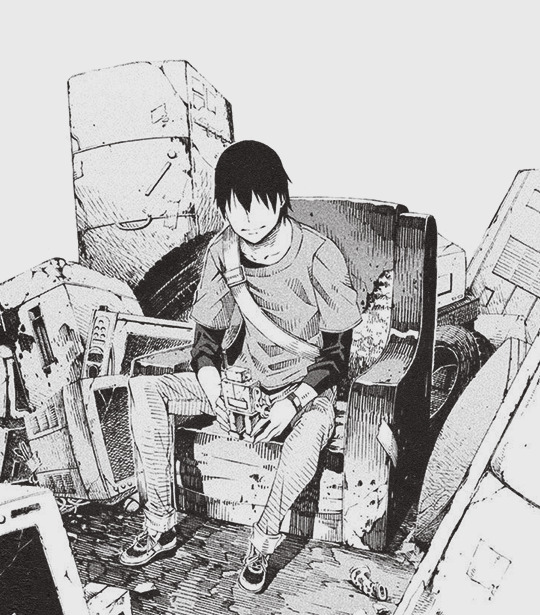
Trickster - Ii (Boku)
This is a post in an ongoing series about the common character archetpyes used by Nisioisin. If you want more information check out the previous post, here. Consider this a part two of that same post. Today we’ll be looking at the nonsense user, and deceiptful protagonist from the aptly titled series “Zaregoto” or in english “Nonsense”. More underneath the cut.
I established the four criteria we are going to be dividing this post into in the previous post, as well as introducing what the idea of the trickster archetype is. Using Kumagawa as the UR-example we’re going to compare Ii-chan with those same tropes.
Introduced as a Villain
Subverts Expectations
Lying, Liar who Lies
Inherent themes of Nihilism
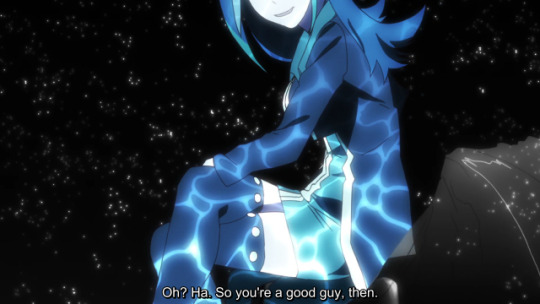
1. Introduced as a Villain
So, next Iichan. He's a special case out of these three because he's actually the series protagonist. But he still kind of fits the criteria because in his series the basic premise of every book is that iichan goes somewhere and a murder happens and then he tries to solve the murder for like the whole book and he sort of kind of solves it and then Jun Aikawa whose much more of a "hero" character than him, the coolest, sickest, strongest detective ever shows up out of nowhere and lectures him.
The sort of conflict set up between Ii-chan and Aikawa as two detectives of the story reminds me of a quote by Maiji Otaro, author of Jorge Joestar (among other things).
“Two detectives, one true. If both are detectives, then both must arrive at the same truth. But does that happen in the novels of this world?” “Most novels with two detectives have one solve it and the other discover the real solution hidden behind it.”
“At that point, are they both still detectives?”
“Hmm.. they’re treated like detectives but certainly, within that novel, the latter is the real detective. But they might switch places in the next novel.”
(Jorge Joestar).
Ii-chan is never introduced as an antagonist from the start of the series he is and always is the narrator. However, he’s still introduced as something he is not. Kumagawa is introduced as a villain and goes on to become a deuteragonist. Iichan is a main character but he doesn’t affect the story like a main character ought to, nor does the story really revolve around him.
So there’s still an inherent lie to his introduction. He is introduced as the center of the story but he is not the story’s real center. However, there’s another subversion implicit in Iichan’s character from the first novel to the second novel.
The first novel is the one where Iichan plays the role of the detective the most straightforwardly. He figures out the trick, solves the case, corners the murderer, but doesn’t solve it all the way and gets lecture by Aikawa at the end. However, there’s a strange way that all the characters react to Iichan despite the fact that he constantly makes himself out to be just a completely harmless, and incapable normal guy.
“Ther’s no meaning. Just like there’s no meaning in your actions. You know, you’re, wow, so you’re the kind of guy who’ll get angry for the sake of a complete stranger. That’s not a very good thing. It’s not bad per se, but it’s not good. [...] That’s because people who can expose their emotions for the sake of someone else are the same people who blame things on others when something goes wrong. I despise people like you.
It had to be the first time in quite a while that someone had spoken that harshly right to my face. Slowly, she brought her glaring gaze to meet my eyes.
“You just let yourself get carried along by other people. You’re the type wo ignores traffic lights just because everyone else is doing it. You’re an abomidable excuse for a human being. They often say ‘Harmonize without agreeing’ but in your case, young man, it’s like you’re agreeing without harmonizing. I won’t say that’s bad. I won’t say anything as to that. One’s identity and worth are not always connnected. A train that runs along a track is better than a train that doesn’t. So I won’t say anything as to that. But I hate people like you. I despise them. People like you always blame things on others, never acknowledging their own responsibility.”
Ii-chan as a character who is introduced as harmless, and passive, never making any choices until we are shown explicitly in the second book that he is not. It’s with his choices in the second book that his true character is revealed.
2. Subverts Expectations
Though for Ii-chan it should really be “avoids any and all expectations.” The Zaregoto is a series that continually asks if the actions of its protagonist are meaningless or not. If any action that Iichan takes effects the outcome of the story in any way.
In Strangulation Romanticist, Ii-chan gets involved with a group of friends who all end up dead or in prison by the end of the story. The central question is what role did Iichan play. Here are some things Ii-chan does in the book, meet with a serial killer and then lie to cover up a police investigation and a private investigator tracking him down giving him time to kill more people, destroys police evidence of another investigation, taunts one girl who murdered another girl into killing herself to atone, knew another murder that was going to take place and did nothing, and then taunts a second girl who wanted to kill herself into killing herself who only survived because the police talked her off a ledge.
“Charges? What charges?” “Falsifying information in regards to the Emoto case, encouraging Aoii’s suicide, not to mention concealment of evidence, plus withholding information and having that little rendezvous with Atemiya. Normally they’d have your ass for that, which I’m sure you’re well aware of, but I’ll take care of it for you. Althought, I suppose even if I didn’t Kunagisa probably would...” (Zaregoto Volume 2)
Therefore, Iichan is someone who acts but doesn’t really face any real consequences for his actions, and that’s because he’s a master of avoidance.
In psychology, avoidance/avoidant coping or escape coping is a maladaptive coping mechanism characterized by the effort to avoid dealing with a stressor. Coping refers to behaviors that attempt to protect oneself from psychological damage.
Iichan is subverting a lot of expectations. He is the protagonist, but the story is not about him. He goes through all of these stories, but he doesn’t ever seem to grow or change from them. He’s a detective, but he never really solves the case or even cares that much about reaching the real truth. He’s written to be a subversion of everything the main character of a detective novel should be.
However, Iichan is also very aware of how a detective should act and deliberately playing with and subverting those tropes. Not only does he subvert the expectations of the reader, but also of the characters around him. He is avoidant, in that way it means he avoids any kind of contfrontation.
I didn’t hate losing. I hated compettition. I was thoroughly put off by the idea of vying for others over something. I hated fighting as well and thus never made friends.
This is a line that gets reused for Kumagawa as well.
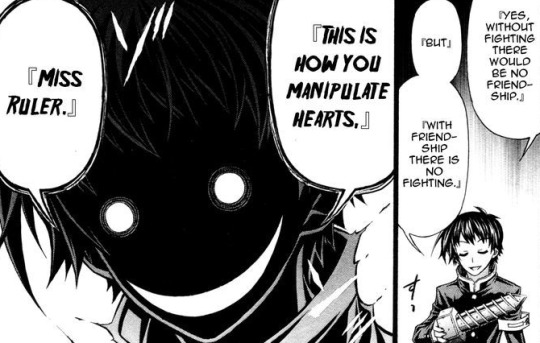
Which helps to illustrate the difference between them. Let’s say there is a problem, Kumagawa will charge head first at the problem and it will explode in his face, and Iichan will do everything in his capacity to never confront the problem or deal with it in any way possible.
Iichan is deliberately aware and sensitive to the expectations of the other people around him, and he feels like he will always be too inferior to fulfill them so he doesn’t even bother to try.
“I have been doing so.” I said. “But you know I have limits, too. It seems like everyone and anyone harbors some sort of expectations from me, and of course I would love to meet their expectations, too, but I cannot meet the expectations if I lack the capability. So to have someone say you failed my expectations is nothing but bothersome.”
Zaregoto Volume 4.
The way he avoids the expectations of others is rendering himself as ambiguous as possible, which is where we get to the next part.
3. Lying, Liar who Lies
Iichan is an unreliable narrator who never tells the truth in a straightforward manner, and even lies for half of the second volume. However, there’s more than that, there’s a deliberate trick to the lies he tells.
Iichan is someone who defines himself as ambiguously as possible. He acts like someone who others cannot possibly understand. Despite narrating from the first person, Iichan is only comfortable when he is not known by anyone. Iichan acts like someone who is barely present in his own story.
Answers have no real point. They’re vague and ambiguos and unsound, and things that are fine that way. In fact, they’re better. Causing real change is a role that should be left up to the true “chosen ones” outstanding individuals like that scarlet Mankind’s Greatest, and the Blue Savant, it was never my responsibility. It was no job for a common loser. For the comic sidekick.
Zaregoto volume 2.
Once again we see the contrast between Kumagawa and Iichan, if Kumagawa is a character who shows how strong and capable one loser can be, then Iichan often waxes poetically in his narrative about how weak and incapable he is. If Kumagawa is a good loser, than Iichan is a sore one.
Iichan defines himself as ambiguous on purpose to avoid responsibility for his actions. In less fancy words, if nobody can understand Iichan than nobody can call him on his shit. That’s his goal, essentially. He doesn’t want to work hard to change, or be confronted about any of his actions, because for him merely the act of living takes all of his effort to tread water without making any progress.
Avoidance is a trauma response, Iichan spends all of his time distancing himself from his own actions rather than confronting any of it. However, Iichan is more complicated than that because Iichan’s ambiguity has another side effect making him out to be something that he is not.
“Just by being there, you startle others, just by being there, you make people lose their grip on themselves.. ther’re a bunch of people like that. You can’t relax when you’re with them, it annoys you, things don’t go as planned, people like that, you know, they’re even scientifically explainable. In other words the missing part. Because the missing part for the observer ends up looking the same, it feels like the person is having their ineptitude pointed out at them, and it startles them [...] You’re just like everyone, and that picks at people’s subonscious, that’s why you’re aimless. And yet you still manage to come out on top. [...]”
Zaregoto Volume 3
All of these things Jun points out in this scene are Jungian ideas of the trickster. Iichan is an inferior person who seems to exist to point out the inferiorities in other people, and use it to play tricks on them. While viewing him as this role of the trickster, Aikawa is not really treating him like a person. (Aikawa’s very dramatic).
Which is where Iichan finally gets his trick. It’s a trick in two parts. He constantly underplays his own agency, while at the same time overplaying his suffering.
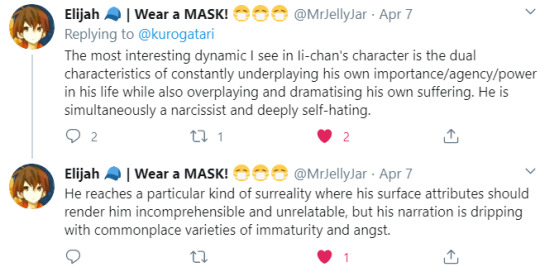
In other words, while insisting that he is the least improtant person on earth, Iichan at the same time hems and haws like the main character of a tragedy. IIichan wants people to empathize with his suffering, and he wants to be important, but he doesn’t want any of the responsibility of being important. He doesn’t want to take any degree of control of himself or others, so he tries to balance himself between these two conflicting ideas.
1) He is not a protagonist, and therefore the events in the story have nothing to do with him. 2) He is the main character of a tragedy. The world is centered around him, he is someone special and important, and that makes him suffer, but he takes no agency in the role.
Doing this he gets the best of both worlds. He gets to always be involved and important to others, while at the same time uninvolved and is never held accountable for his actions. He’s never challenged or forced to grow or change in any way.
These are the two lies that Iichan tells, and those lies form a narrative. Iichan is lying to give a narrative to his own trauma, and therefore try to extract some kind of meaning from it.
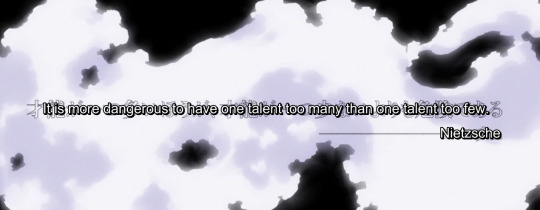
4. Inherent Themes of Nihilism
We once again return to the sacred image.
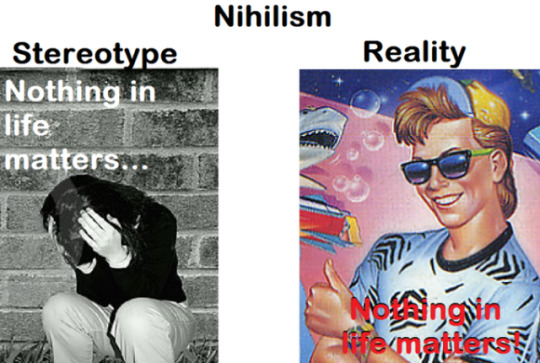
Iichan is a moral nihilist. He’s on the elft side of that image.
Moral nihilism (also known as ethical nihilism) is the meta-ethical view that nothing is morally right or wrong. It is built on three principles.
1. There are no moral features in this world; nothing is right or wrong. 2. Therefore, no moral judgments are true; however, 3. Our sincere moral judgments try, but always fail, to describe the moral features of things.
Iichan’s view is basically that of, if there is no meaning to this world then any attempt to define meaning is pointless. He (let’s say it again class) usually uses this as an attempt to evade any and all responsibility for his actions.
Iichan doesn't want other people to look at him, he doesn't want to be at fault when things go wrong, but he also wants to be important. So he's continually on a tight rope walk with those two very conflicting desires.
So basically Iichan sees no value in his own actions. He sees no value in the world. He doesn't really have any set of morals, except that he thinks murder is bad. Except sometimes he doesn't really care if certain people are murderers. Zerozaki is a murderer and Iichan hates him but doesn’t actually make any sincere attempts to stop him. Kunagisa commits murder in volume 4/5 and Iichan goes out of his way to cover it up. He apparently doesn’t consider goading a girl into suicide to be a form of murder. But at the same time he's so desperately searching for meaning, because he wants to feel fulfilled.
Iichan thinks that talent and genius are perhaps one thing that could give the world meaning. His best friend is a super genius, and he kind of clings to her and is jealous of her because she's someone special. See he thinks there are people whose lives have meaning despite being a pretty blanket nihilist, but because he's not talented he's not one of those people. Talent is something that could possibly give life meaning but being outside of the talented people it makes no difference to him he can only gaze at it from afar
Iichan is someone who is constantly downplaying his own meaning, while at the same time trying to find some meaning vicariously through others, like Aikawa and Kunagisa who he considers to be the real heroes of the world. Despite Iichan insisting there’s no meaning, he also has an attraction to narrative view of the world. Which is something that you know... has meaning, because stories are written with intent and purpose by an author.
In the sixth volume there’s a concept called “The Story” which one character belives that everything is pre-destined, like it’s all some pre-written story. Therefore while you can make small changes in your own actions it never effects the big picture in any way.
This is once again a very convenient idea for Iichan, who avoids responsibility to believe in. He’s very attracted by this idea because it takes control out of his hands and means his own actions aren’t really his fault.
To be honest, this must be one of the most boring conversations to be listening in on. It had gone so far into the conceptual, that even for myself, participating in the conversation, the words of the man with the fox mask seemed as hazy and illusory as a dream. You could say I do not understand what he is saying. However, then why. Then why does what this person says strike so deep? Why does it resonate? [...] Then, no. I do not want any part of such importance. I do not want anything to do with the core of the story.
Here we go with Iichan’s double negative, he denies having any role or agency in the story and yet at the same time believes that such a thing as the story exists because it means to some extent his actions are out of his control because he can’t accept that they are.
Is Iichan’s role in the story ultimately meaningless? No. There are always clear and distinct consequences for his actions. In the same volume (6 - cannibal magical) where the concept of the story are first introduced that everything is predetermined and you can’t change the big picture, the events of the story disprove that assertion.
Iichan is given like, a million warnings not to go to a lab. Aikawa tells him not to go to a lab because she has a bad feeling about it. The literal assassin sent to that lab talks to Iichan and says “Yeah, I was sent here to kill people.” Another person who was in the same situation just walks away from the problem. Iichan sees the assassin going out to kill people in the middle of the night and just chooses to... go to sleep.
Then he wakes up to everyone dead in the morning. The point being Iichan had a million chances to avoid this situation, takes absolutely none of them, and then acts like this was a completely unavoidable fate. He hems and haws about having no choices, but he’s clearly given choices, he just doesn’t take them, or makes exclusively bad ones.
Iichan wants to avoid consequences by not choosing, however the choice to not choose is still a choice in itself. Everything is a choice. Even avoidance is a choice. Which is why Iichan’s actions do actually have meaning, just not in the way he wants them to. He’s not a special person, and he’s not anyone extraordinary, but he is someone who has to face the consequences of his actions no matter how many narrative tricks he pulls to avoid them.
The actual trick of Iichan’s story is that he really is the protagonist, he just doesn’t want to be.
71 notes
·
View notes
Text
Note #28: Metaphysical detective fiction: escaping the confinement of the genre
(This note contains major spoilers for Danganronpa series and Umineko series)
One of the best things I have learned from studying this clue-puzzle genre’s history is the term “metaphysical detective fiction”. With it, I have finally pinpointed the subgenre I have been trying to learn about.
My interest in detective meta-fiction probably began with the ending of Danganronpa V3. The manner in which the last trial pointed out the consumerism and repetitive violence of the series was the first time I ever saw a detective fiction addressing its own rigid story structure. Since then, I started to pay more attention to any story element that might display self-awareness of the genre’s construction. My interest in these metaphysical elements reached its peak when I gave Umineko a try. To the best of my understanding, Umineko was not only a love letter to detective fiction, it was also a critique of the Golden Age formula by challenging its convention in each Episode.
Originally I only associated the term “metaphysical” with stories that break the fourth wall to tell its message, and while a story like that may be part of meta-fiction, in reality meta-fiction contains more than just that. Based on my current understanding, detective meta-fiction includes anything that plays with the genre’s convention by explicitly drawing attention to such manipulation. For example, in Danganronpa V3, The sixth trial reveals that the main cast are fictional personalities created to entertain the audience. Meanwhile, one of the biggest twists in Umineko showcases the difference between the artificial, entertaining murders created by the witch Beatrice versus the real gruesome truth of the fateful days on Rokkenjima island.
Nevertheless, I still have a lot more to learn about metaphysical detective novels with the history of the term as well as some contemporary examples being my main focus for the time being. Jorge Luis Borges’ detective stories such as “Death and the Compass”, Umberto Eco’s The Name of the Rose, and Nisio Isin’s Zaregoto series are my current reading priority.
1 note
·
View note
Note
Pls... your top ten nisioisin characters... i love your lists...
I LOVE TO TALK ABOUT HOW MUCH I LOVE MY FAVES. IF YOU EVER ASK WANT TO ASK ME WHO MY FAVES ARE FOR A SERIES FEEL FREE TO SEND ME AN ASK.
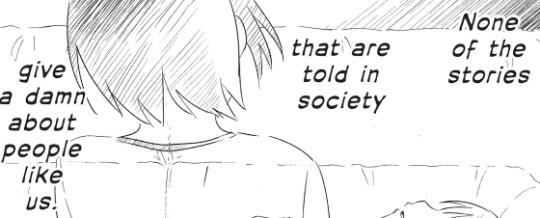

My favorite thing about Niosisin’s characters is how genuinely subversive they are. Not in the sense that he’s deconstructing tropes, but rather these are characters who would never get their story told in most other books, because they are not good, or righteous. Nisioisin breathes life into them, and allows those who cannot be forgiven, those who are deviant, those who have dropped out of society to still remain human. He tells their stories the same as everybody else, because their lives are just as fun.
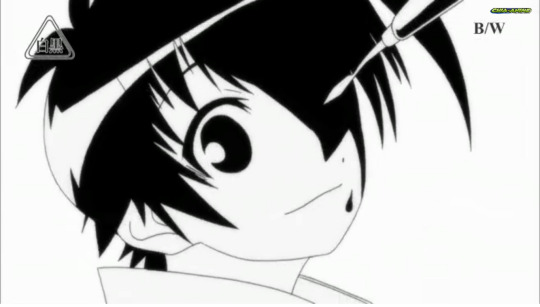
1. Even if I’m hated, Even if I’m Despised - Kumagawa Misogi
He’s only my favorite character of all time so I’ve talked about him on this blog before, but let me find something new to say. Oh Kumagawa, how do I love thee, let me count the ways. Or maybe it’s Oh Kumagawa, how do I despise thee let me count the ways.
Kumagawa’s character is so interesting because it’s written in antithesis of everything a shonen protagonist is. For Kumagawa, his determination just makes him fail worse and worse. His desire to be involved and help people always guarantees the worst result for the people he wants to call his friends. His empathy is extremely painful for him, and is a trait that drives him insane rather than making him a kind and loving person.
A lot of time in manga empathy is like, a magic fix-it-all bandaid that basically makes the main character a saint by being able to emotionally relate to anybody. Kumagawa is the reality of that situation. He is empathic, and by relating so much to the humans around him he shows how ugly, and messy human emotions can really be. Recovery and saving others isn’t necessarily a beautiful thing, it’s complicated and sloppy.
Kumagawa is a character where getting stronger won’t solve any of his problems. Which is what happens in a lot of shonen manga, rather than trying to emotionally mature the main character will just learn a new fighting technique and develop that way. Instead, Kumagawa winning fights means absolutely nothing. The only thing that can free him is to grow up as a person, and the fact that Kumagawa’s arc is given equal weight to both of the main characters shows how accepting of weirdoes and broken off beat characters Nisioisin is as an author.
What I like about him is how genuinely broken he is, but not for monstrous reasons but for entirely human ones. It’s his genuine care for others that breaks him the most. He’s a character written to be insane, but also geniunely human. Kumagawa is not able to live properly, or even act like the main character like Zenkichi and Medaka are but he’s still able to find his own way to live.
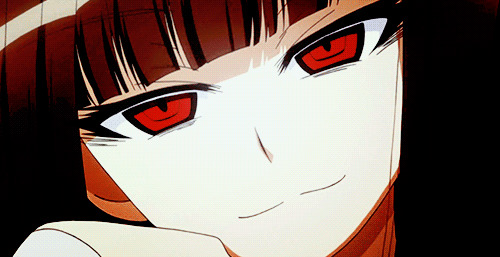
2. I don’t feel any reality from you people - Ajimu Najimi
“Genius who is super good at everything, but is secretly sad and lonely on the inside” is a pretty common Nisioisin trope. It tends to be pretty hit and miss with me, but it also resulted in one of my favorite characters of all time. I tend to like these types of characters more when they’re allowed to be… what’s the word… unlikable. When the story isn’t trying to go on about how cool they are.
The reason why I love Ajimu is because she is just like Kumagawa, a subversion of the character you expect her to be. The same way Kumagawa suverts Zenkichi in a way, Ajimu subverts Medaka. The same way that Medaka is all loving, Ajimu is indifferent to absolutely everything. The reason she’s able to be kind to everyone around her is because she genuinely doesn’t care about you. Her real personality when not being apathetic, is to just be downright nasty and look down on absolutely everything.
She’s completely self absorbed because according to Ajimu she’s the only one who exists in the universe. She’s the only one she knows for sure is real. The opposite of Kumagawa, a character entirely lacking in empathy, not even thinking of herself as human in any sense of the word. Ajimu acts like she knows everything in the story like she’s reading off of the script, but that’s because she literally thinks that everything in this world is fiction and she’s literally breaking the fourth wall.
And my favorite part about Ajimu is that the story doesn’t glorify her meta fourth wall shenanigans. She’s not treated as someone who sees through everything in the end. She’s just pathetic, and suicidal, and dragging everybody else along into her trillion year long self pity party. She’s more of a human failure than someone who can’t possibly empathize with humans, and that’s why I love her.
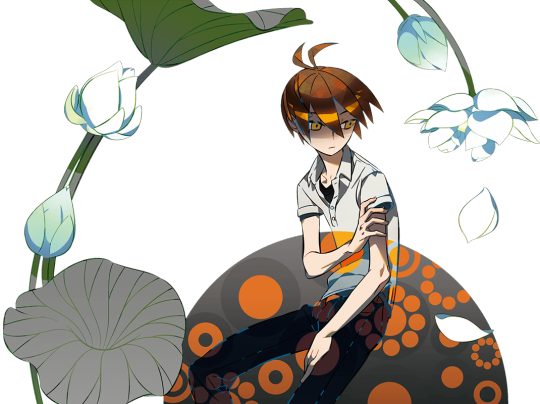
3. There ain’t no meaning, got it? - Ii (Boku)
Ii-chan is the narrator of Nisioisin’s first ever series, Zaregoto (Lit. Nonsense). It’s not really until the second book you get a grasp of his character, but Strangulation Romanticist does such an excellent job of setting up who he is as a person. This is another one of Nisioisin’s character types (narrator who feels ennui, and really, really doesn’t want to be a person).
What’s great about Iichan is that he is special in a way. Just like he’s described in the books, when he’s thrown into situations everything goes a little bit crazy. He always gets dragged into mysteries, and has people die around him even though he tries to stay as uninvolved with people as possible. He’s actually a great look at what a character constantly caught up in murder mysteries like the main character of a detective novel would actually act like. He has this deep rambling narration that sways between nihilism and existentialism that makes him a really unique character to read about.
But at the same time Iichan is also kind of a normal dude. And I don’t mean in the sense that he’s an everyman, or has no personality, but he kind of just feels like one. The great twist of No Longer Human is that Yozo isn’t some inhuman monster, he’s just kind of a normal guy who drowns out his misery by taking advantage of women. Like, it’s not all that uncommon. The same thing with Iichan, as poetic as he gets he’s kind of a very petty person and most of his flaws are very mundane ones.
It’s basically very hard to care about other people in this world. Ii-chan doesn’t want to at all, he just wants to have all of his emotional needs fulfilled by the friend he both infantilizes and puts on a pedestal. He’s just super clingy about the one relationship he has in life, because he’s afraid of losing it, but he’s also afraid of being close to her. Ii-chan is just kind of a normal person reacting badly to trauma, but he presents himself as such a mystery that most people lose sight of that (in story). He’s kind of just petty and annoying, and that’s why I love him.

4. No Longer Human - Hitoshiki Zerozaki
Zerozaki is Iichan’s greatest character foil. Basically the best way to describe it is Zerozaki is Mersault. The flip that is switched on for everyone that prevents them from killing someone when the idea crosses their mind is turned off for Zerozaki, and so he kills. He doesn’t enjoy it, he doesn’t have a particular reason to it, he just can’t overcome his impulse to kill. If Ii-chan is restrained, then Zerozaki never restrains any of his impulses at all and lives following only those.
Once again this is another common Nisioisin character archetype “A murder, but they’re sad and lonely.” What I like about Hitoshiki is how much of a deviant he is to that archetype.
He wants a friend and somebody who understands him, but at the same time he hates himself so he doesn’t want anybody too close. He lives in a family of murderers and he’s somehow the rebellious child of the family. He’s constantly running away and wandering from place to place. What makes Zerozaki interesting is how self aware he is about all of this too. He rambles his thoughts and will just be like “Yeah, so anyway that’s totally fucked up (LOL).”
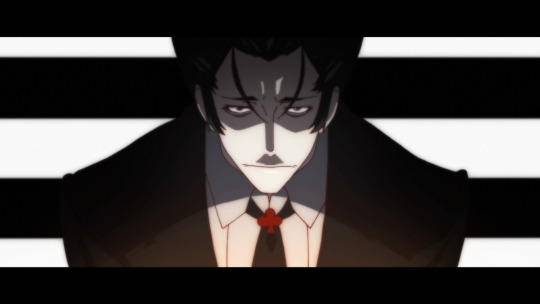
5. Is your life dramatic - Kaiki Deishuu
Kaiki is a character who I admire for his philosophy above all else. He’s another one of those “deviant” characters like Kumagawa who would just be a villain to be defeated in any other narrative, but in this one he gets fully fleshed out as a character.
What’s interesting about Kaiki is that he chooses exactly the way he lives. He decides to be a villain. Kaiki at some point sees through most of the lies of the people around them, and for how meaningless the things that you are told have value can be. He hates holding onto ideas like those.
But that doesn’t mean that Kaiki rejects everything. He doesn’t claim to see above society, or that he’s not a part of society. Rather, Kaiki just uses that awareness to realize he can give meaning to whatever he personally finds meaningful. Because it’s all meaningless anyway, as a human being he can create his own meaning.
So his want of money is not just simple greed, it’s what he’s decided to live for. Kaiki is an adult who willingly chose to become a conman because he finds that’s his place in society. He just doesn’t trust himself enough to be kind despite feeling the same desire to save others, so he decided to lie to them and trick them instead.
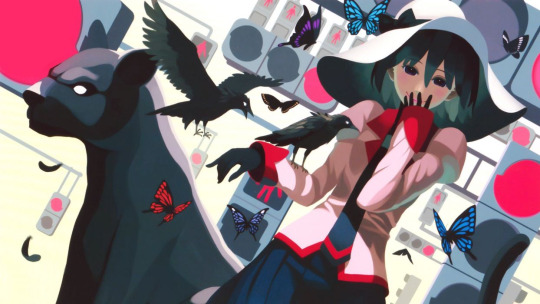
6. “I don’t know anything, you’re the one who knows” Oshino Ougi
Ougi is just interesting conceptually. They are literally Araragi’s own shadow, running away from him and given form and consciousness of their own. While Ougi themselves works as a common Jungian shadow archetype calling characters out for what they are repressing and also revealing the bare faced truth to them, which is why they are so heavily associated with mirrors, lights, and shadows.
My favorite part about Ougi however is not their connection to Araragi. It’s when Ougi starts to become their own character. An oddity with consciousness that begins to deviate from what they were made for, because they were allowed to live on their own.
Ougi did not become a fave of mine until Zoku because that was when they started to self reflect and realize their own strange existence separate to Araragi. The conversation scene with Araragi is one of my favorite in the whole series because it shows how Ougi is just a genuine tease, and a very clever and insightful person. That’s who they are, outside of just being an oddity that exists to criticize others and call out flaws. They’re ridiculous, and a little strange, and they enjoy screwing with other’s heads and messing around a bit too much. But Ougi Oshino is Ougi Oshino.
It’s just an interesting concept, to have to define who you are as a person when you were created out of all of the unwanted qualities, and insecurities of another person.

7. Why are you touching me without permission, you weed - Yasuri Nanami
Nanami is another one of those “I’m a genius and I’m good at everything but I’m secretly sad” characters, and once again what I love about her is how unlikable she’s allowed to be. None of what Nanami is capable of comes off as cool for very long. She’s basically framed and treated as a horror movie monster, always speaking in the same monotone voice. The one story that shows her true nature in chapter four is literally, paced, framed, exactly like a slasher movie with characters being hunted down and killed one by one.
Nanami’s just this horrible wretched existence that doesn’t even want to be alive. She basically acts like frankenstein’s monster, ie, the one in the book. She’s just this corpse that is barely even alive in the first place, constantly sick and in pain, and she’s also at war with herself. The part of her that wants to die and the part of her that’s lonely and wants to find some reason to live, or some connection in life are constantly at war with each other.
And as horrifying as Nanami is she also feels like the most human of Niosisin’s, super-genius characters. She’s riddled with weaknesses and flaws. She lashes out when he’s in pain, she felt bad when her parents told her to die. You get the sense that Nanami’s super genius isn’t what drove her insane at all, it was just how everybody around her treated her as some thing that was not human. Isolation made her this way. She was conditioned to act this way not born inhuman. There are characters that Nisioisin writes that are genuine sociopaths (as in the trope of an unfeeling person unable to feel human emotions), but Nanami is not one of them and so when she starts acting with sociopathic-traits in her personality it makes her all the more painfully human because we see how she’s been driven slowly to act this way.

7. *Yawns* Nezumi
Juuni Taisen is one of those death game stories where every character is defined by their one gimmick and written around their concept. In the original novel each character really only gets one chapter to be fleshed out as a character. I half suspect Nisioisin wrote it as a dare to himself on how much he could accomplish with one chapter.
The interesting part about Nezumi is his concept again. He can redo anything 100 times. You think this would make him amazing at anything in life because of his time loop ability, but physically having to live through all of those time loops exhausts him to the point that he’s too tired to do anything. You would think he could get anything he wanted out of life, but there are times he can ask a girl out one hundred times and get rejected one hundred different ways.
Nezumi is interesting because of how quietly he lives. There’s nothing he really wants out of life, and nothing he wishes for, like a rat he just scurries and survives.

9. I am currently being accused by everyone - Kakushidate Yakusuke
The same as Iichan and Kumagawa, Yakusuke is a guy who is just cursed by constant bad luck. What I like about Yakusuke is that he’s a full fleshed out character, instead of just an unlucky every dude protagonist.
He’s a contract worker who is constantly shifting between jobs. Due to this fact he’s got like 1,000 skills that he gained on his various jobs. He’s not smart, but because he’s experienced so much of life he’s incredibly resourceful. Which is why he makes a perfect counterpart and foil to Okitegami.
Yakusuke’s everyday life is him constantly being accused and blamed, and falling from one bad situation to the next. But, he has so much experiences that it’s what draws Okitegami to him who can only ever experience one day at a time because her memories will reset at the end of the day. He’s exactly my type of man, a total failure at all walks of life.

10. This is your last chance, let me make you happy! - Kugi Kizutaka
He’s so low on the list because his story “Magical Girl Ritsuka” only has one chapter published in english, but he’s so interesting he instantly became a fave. He’s actually a concept i have been looking for for a long time, which is basically what I describe as “Reverse Junko Enoshima.”
Basically someone as smart and manipulative as Junko Enoshima, who can make anybody into their toy, and predict things years in advance and control everything, but instead of using that power to send the world to despair, they use that power to give the world hope instead. Not out of any genuine good will or because they’re a good person, but because they’re obsessed with the idea of giving people happiness the same way Junko is with sending people to despair.
Kugi is a lot like that. He’s a genius ten year old who sees everybody for their potential to be used, and looks down on absolutely everyone around him. He’s made contact with a magical girl, because he’s pretty clearly planning on using her to enslave the world to him, so he can force everybody to be happy. And it’s absolutely adorable. He’s just such a genuine terrible little person while at the same time wanting to make everyone happy.
#spooky speaks#nisioisin#kumagawa misogi#ajimu najimi#iichan#iikun#hitoshiki zerozaki#kaiki deishuu#oshino ougi#yasuri nanami#kakshidate yakusuke#nezumi#kugi kizutaka#medaka box#bakemonogatari#magical girl ritsuka#zaregoto#katanagatari#Anonymous#nisio meta
217 notes
·
View notes
Note
Hi! You’re truly an interesting and fascinating person. Your meta and insights are very useful. And as others said, extremely well put and though out. You’ve mentioned before that you read extensively… Is it okay to ask for your reading recommendations? Whether it may be essays or books or manga, I’ll happily take it! Of course, it’s okay if you cannot answer that (—w—)/✨But please accept my earlier compliments and heartfelt appreciation of your time in putting your analysis together! It’s always so fun reading them. That’s all, thank you!
(ノ∇≦*) ღゝ◡╹)ノ♡
Thank you so much. I am very bad at accepting compliments but I will try my best for your sake. I made a long list of my favorite books over here, but if you want more reccomendations here’s a few off the top of my head.
The Farseer Trilogy by Robin Hobb.
If you like the female characters written by George RR Martin, but George’s writing makes you a little ehhhh, than I highly recommend these books. They are a deconstruction of the standard fantasy tropes, but written by a woman TM with a lot more sensitivity. FItz is one of the most toxically masculine protagonists I’ve ever head, but also he’s my baby girl and I love him. There’s just a lot of emotional intelligence written with these books, and also it’s less triggering than Game of Thrones so if you want to read a deeply thoughtful fantasy series this is it.
Prince of Thorns, the Broken Emptire Trilogy. by Mark Lawrence
I just reccomended a series as a less triggering version of Game of Thrones, but do you want to read a fantasy that’s much more explicit??? Than read this one. The strength of this series is the main character as one of the most vile, but also uniquely sympathetic main characters in fiction and I like his journey leading to redemption at theend of the last book. The world of this book is also incredibly interesting, because the twist is instead of the standard fantasy setting TM it’s post apocalyptic with society having been reset to the middle ages due to a nuclear war.
Boogie Pop Series
My favorite light novel series of all time is Zaregoto, but if someone were to ask me to reccomend them a light novel that shows to a person who’s never read light novels before the storytelling potential of them I’d say Boogiepop. Boogiepop is a cyberpunik / fantasy series where every single installment is an episodic adventure loosely connected to this world where these normal high school kids and people brush against these supernatural phenomena and they all have strong characters and themes that make you ask questions about real life. Good light novels, use the medium of short stories and light prose to try telling really experimental stories outside of mainstream with cult appeal that ask you really hard question.
THe first six novels are translated, and if you read those six it will give you a complete enough picture to understand the appeal of the series.
The Queen’s Thief Series by Megan Whielan Turner
I read this recently. If you want a series that is about the difficulty of rulers ruling without like a million subplots like there is in game of thrones, this is a much more concise series with a well written ending. Also, one thing I do like about the series is from book 4 onwards it’s told from the perspective of characters who usually don’t get a narrative voice in these kinds of series, book 4 is narrated by a slave, book 5 has a long subplot about the horrors of slavery as endured by a major character, book 6 is narrated by a character who is born both defroemd and autistic and they’re a fully fleshed out human being. They are capable of mistakes and learning, they have difficutlies with things but they work hard to make up for them, they are not secretly a genius even if they have a special interest in numbers, they also start improving and recovering when everyone around them starts treating them like a human being.
The Count of Monte Criso by Alexandre Dumas...
s one of my favorite books ever, and I totally forgot to mention it on my favorite books list. It’s not only the greatest revenge story ever written, it makes a case for why straightforward revenge stories are not only bad, but kind of boring.
Basically even Edmond Dantes, a character falselsy imprisoned, betrayed by both his closest friend and the woman he loved who has every right to his revenge chooses to abandon revenge in the end, because not only does it spiral out of control and almost hurt a complete innocent, but also his revenge while maybe desered wasn’t helping him heal as a human being the same way the love of the woman closest to him was.
Journey under the Midnight Sun by Keigo Hashino
I’m a fan of this authors other works, especially his detective novel, but if you want to read an emotional story that will cahnge your whole life, you should read the story of the two children in this book just trying to grow up and live their lives in a world’s that horribly unfair to both of them.
In the Miso Soup by Ryu Murakami
I actually reccomend a lot of Ryu Murakami’s works if you’re trying to get into japanese surrealism and horror. Fair waning though, they are all, like, incredibly graphic. I’m reccomnding them to you as a horror fan. Piercing, by Ryu Murakami is also a good one.
The Portrait of Dorian Gray by Oscar Wilde
This is another one that almost made my top ten list. It’s in the same vein of horror as Frankenstein and Dracula, but it is also deeply existentialist and philosophical/ The horror element of this kind of takes a backseat, to the character discussing philosophy like the benefits and drawbacks of hedonism, and the human condition. Oscar Wilde is also, a gay man, who was tried for sodomism after writing this book, so there’s a strong historical homosexual subtext to consider when reading this book too if you’re considering reading with that sort of thing in mind.
The Murder of Roger Ackroyd by Agatha Christie
This is my favorite mystery novel of all time. It basically invented the unreliable narrator trope, though, saying that is kind of a spoiler to the novel so I won’t say anything further. Edgar Allan Poe may have invented the mystery genre, and Sherlock Holmes may have popularized it, but Agatha Christie made it swaggy.
The Decagon House Murders Ayatsuji Yukito
I have to bring up this author if I bring up Agatha Christie, because their debut work was written as a response to AND THEN THERE WRE NONE (please google the original title I don’t want to talk about it) and if you’re not comfortable with Agatha Christie’s works for reasons, they are a very smart and modern take on tropes that were popularized by Christie. They’re a part of the Shinhonkaku school of detective fiction, or Neo Orthodox which is basically a throwback to the classics.
Goth by Otsuichi
Another one of my favorite japanese Horror authors, I reccomend Goth along with Black Fairy Tale, they are both horror pieces that focus on the characters and their struggles instead of gore which really creates an effective horror as you sympathize and despirately wish for the survival of the main cast. Also, this is a dumb observation, but Goth’s ideas are very.... gothic in nature.
Literally anything by Shirley Jackson
All of her novel length works are worth reading, I’ve read them multiple times. The haunting of Hill House is famous, but I’d amost reccomend less well known ones like Hangsman or We Have Always Lived in the Castle, because they use Shirley Jackson’s trademark surrealism to illustrate their points so clearly despite not being straightforward horror like haunting of Hill House is.
Okay, I can’t remember any more books I like, I hope that’s a long enough list to satiate your tastes.
34 notes
·
View notes
Text
Ougi and Araragi
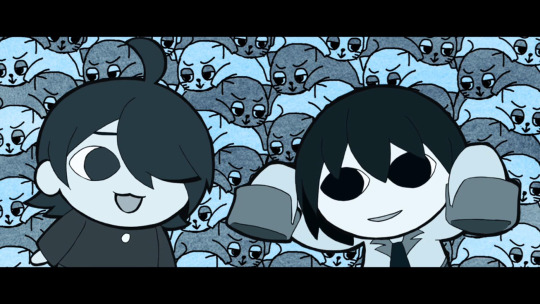
Hi! I was wondering if you could write a meta about Ougi from the Monogatari series.
It’s impossible to talk about one of them without talking about the other, so let’s discuss the unique relationship between Ougi and Araragi underneath the cut, the special relationship between a boy and his shadow.
1. Character Concept: The Jungian Shadow
There’s a lot that can be discerned about Ougi just from the type of character they are. Their relationship with Araragi defines them entirely, without Araragi there is no Ougi.
Ougi’s design is intentionally meant to parallel Araragi’s. Araragi has a very bland light novel protagonist kind of look to him (hence why he never gets any cover art) his only distinguishing feature is that his hair is styled to cover one eye at almost all times. This is because Araragi’s primary character trait is obfuscation looking at things through only one eye you are never going to get the entire picture.
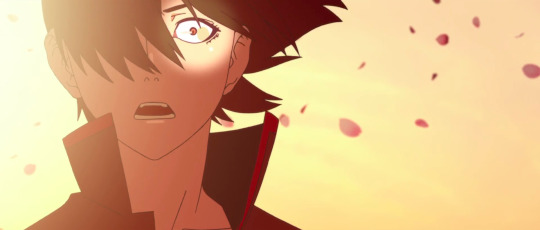
If Araragi’s character design is plain and normal, because that is what the primary protagonist type of these kind of series are an ordinary high school boy, then Ougi’s is the opposite, their design is attention grabbing and unique. If Araragi is normal, Ougi is visibly abnormal, you can already tell there is something subtly off by looking at them. What Araragi hides underneath the surface, Ougi is.
The primary feature of Ougi’s face and the one you notice immediately is their eyes, large, dull eyes, which are the focus of their entire face. Ougi is always shown staring forward with those eyes, unblinking, directly at you. It’s symbolic, eyes are symbols of insight, if Araragi obfuscates then Ougi sees everything. Ougi also wears the Naoetsu high girls uniform. They take the appearance of what Araragi cares about the most, a girl that he can save. Their skin is pale, and their hair dark, which could mean two things, either black and white, light and shadow kind of thinking that Ougi represents or, it’s just supposed to make them look like the kind of ghost that is common in Japanese horror.
Finally, Ougi’s sleeves are so long that their hands are almost never shown. This indicates two things, one human hands are signs of intimacy. What are your hands for? is a pretty famous quote from Evangelion, by never showing their hands Ougi cuts off intimacy because they exist as a symbol of isolation. The next is that Araragi is characterized as someone who always reaches out a helping hand, whereas Ougi is the opposite they stress individual agency and often leave others like Nadeko to their own fate. They may orchestrate things from the shadows, but ultimately Ougi never directly acts, and let’s the characters decide to step off the cliff all by themselves.
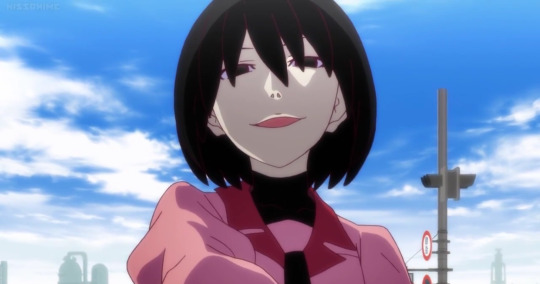
The fact that Araragi a boy, makes Ougi appear as a girl is also a play on binary gender. Ougi is technically genderless, but they appear as a girl initially because themes of binary opposition, and black and white thinking are at play in their character. Araragi is someone who tends to see the world in a binary way. Light and dark, black and white, male and female, they assume there is some kind of proper order to the world that needs to be followed. When Araragi begins to let go of these ideas Ougi is freer to express their gender any way they like.
A binary opposition (also binary system) is a pair of related terms or concepts that are opposite in meaning. Binary opposition is the system of language and/or thought by which two theoretical opposites are strictly defined and set off against one another.
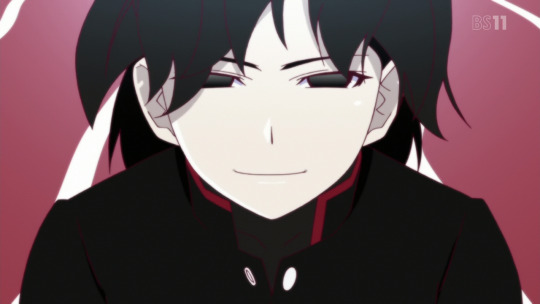
Ougi is based primarily on two ideas. One of them is a pretty obvious reference to the King of Distortion from Boogiepop, which is the series which started what we now call ‘Light Novels’ in Japan by popularizing urban stories with heavy sci-fi or fantasy elements. Araragi even directly references the king of Distortion.
“Tell me, what are you thinking about now...?” “Don’t suddenly become the king of Distortion.” Out with the cool quotes, scolded my sister. I deeply reflected on it. (Nekomonogatari White).’
The king of Distortion is a character who’s physical appearance and personality changes with every character they interact with, and who is able to enter the dreams of other people and see the desires in their heart after which point he makes an attempt to correct them.
While the King's personality changes with whatever person's form he is taking, in general, he seems to share a soft-spoken, calm and collected attitude each time, always seeming confident, most likely because of his knowledge of distortions in the hearts of each person's subconcious he enters. He claims his goal to be to 'turn the people's suffering into gold', which involves having people deal with their inner turmoils and coming to terms with them, which is why Boogiepop does not consider the King an enemy of the world, as he doesn't truly do anything particularly villainous.
King of Distortion like Ougi is also born from a single character’s regrets. The King of Distortion was born the moment Shirou Tanaka arrived at the Moon Temple. The main cause for the King's creation was the pent-up regret Shirou felt after entering a relationship with Naoko Kamishiro even though he didn't love her, figuring that he would just develop feelings for her later. After the girl's death, Shirou's self-hatred grew as he realized he wasn't particularly affected by her death in any real way. These feelings were also amplified by the fact that he knew about Akio Kimura, someone who truly loved Naoko, and deserved her way more than himself. These complex feelings of his manifested as the King of Distortion, a being born from Shirou's MPLS evolution.
King of Distortion is an entity born from repressed regrets and self hatred, what a character refuses to acknowledge about themselves or confront. Therefore, both King and Ougi are Jungian shadow archetypes.
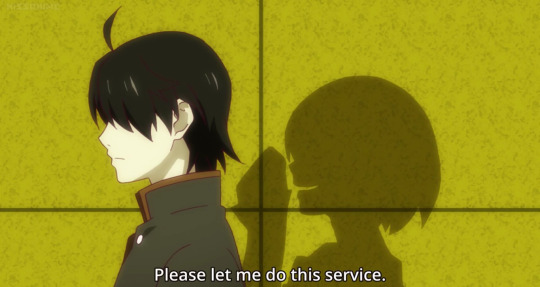
Both as one, one as both.
One is both, both are one.
The Niounomiya siblings with their slaughtering magic.
He and she pass their time in the same body.
Passing their shuttered time.
Passing their shuttered space.
She is Jekyll, and he is Hyde.
One as both, both as one.
Both are one, one is both. Hitokui Magical - [x].
Robert Louis Stevenson wrote the now famous tale, The Strange Case of Dr. Jekyll and Mr. Hyde, a story famous for its astute psychological insight that “Man is not truly one, but truly two.”
In Stevenson’s novel, Dr. Jekyll is a well respected doctor who cares deeply about the admiration of others and strives to be a good human being. In his laboratory he concocts a potion that when ingested transforms him into Mr. Hyde a primitive, unruly and destructive man. Reflecting on the nature of his transformation, he discovers a truth about the nature of a human being.
“I learned to recognize the thorough and primitive duality of man; I saw that, of the two natures that contended in the field of my consciousness, even if I could be rightly said to be the either, it was only because I was radically both.” [Source.]
The shadow exists in a dual relationship with the persona, developing in turn with it. In Jung’s terms the self, is the sum total of the psyche. Both is one, and one is both.
The persona comes from the latin word for “mask”, it’s the elements of personality which arises “for reasons of adaptation or personal convenience.” [Source.] It’s a simple idea, the way you talk around your friends is different from the way you talk in front of your grandmother. People are constantly choosing consciously which parts of their personality to show in front of others, especially in relation to how they would like to be perceived. It is a performance, but that does not mean it is not real. Every part of the identity matters.
It leans heavily on embodying only one’s best qualities, leaivng all those negative traits which contradict the Persona to form the “Shadow.” Jung called the shadow the part of the psyche the unconscoius aspect of the personality. Because one tends to reject or remain ignorant of the least desirable aspeccts of one’s personality, the shadow is largely negative. It consists of everything which exists outside of the light of consciousness, but it can be both positive and negative. “Everyone carries a shadow”, Jung wrote, “And the less it is embodied in a person’s life, the blacker and denser it is.” The shadow is unscious, things which our mind experiences but we cannot control, dreams, desires, instincts.
Without a well developed shadow, a person can easily become shallow and extremely preoccupied with the opinions of others, much like how we see Araragi act in Monogatari. Jung believed that, not wanting to look at their shadows directly, many people project those flaws onto other people.
In terms of literary theory then, the Jungian Shadow archetype is a character who is made up of all the flaws that the protagonist refuses to confront. They challenge the protagonist merely by existing, because the protagonist wants to look away and leave those qualities unacknowledged. Often, they are an antagonist merely because the protagonist projects all of the flaws they cannot see into themselves, onto that other person.
2. Araragi Koyomi - He Obfuscates
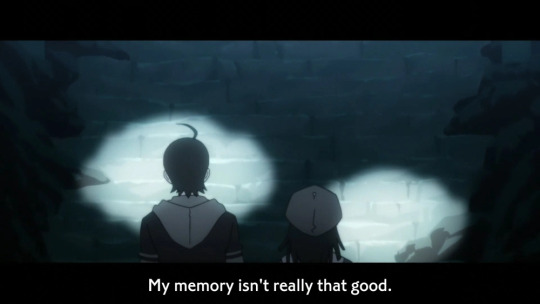
It is impossible to see the shadow without the light. It is impossible to describe Ougi without first talking about Araragi Koyomi. Just like Ougi, let’s start with the origins of his character. While this is just my own personal speculation I’m not NisioIsin, Araragi has always read as written in response to two things to me: First Ii-chan, the protagonist of his first series Zaregoto, and second harem protagonists in general.
II-chan and Araragi are both very flawed and non-confrontational human beings, but whereas Zaregoto is a story about how II-chan really does not want to change himself and instead just kind of wants to stay treading water, wants to never cause any more ripples, wants to hold onto the fragile sense of self he has Araragi’s is a story of a bad and hypocritical, shallow kind of person striving to grow up and become a good person, acquire depth.
The stereotypical harem protagonist is this, a plain guy with no personality who somehow gets girls to fall all over him, often for showing them the bare minimum of kindness. Monogatari is partially a deconstruction of harem series because it shows the kind of circumstances that would cause all these girls to fall all over one guy, literally they are all so deprive of affection that the smallest show of kindness does actually make them fixate on Araragi.
The thing is Araragi does have a clear personality. He is very cynical, he’s judgemental of other people, he really likes to snark. Part of the reason he likes talking to Senjyogahara so much is he can be meaner, and sharper tongued than he normally presents himself as around people. He has traditional black and white views of justice. He tends to meddle. He is observant, but his style of thinking is flawed because he tends to jump to conclusions quickly rather than thinking out the details slowly and methodically. He’s almost constantly anxious, but usually responds to the anxiety with avoidance. However, a lot of his more distinct personality traits sound more negative rather than positive, so Araragi has a version of himself he presents to others who he is less close to. This ‘self’ is much more vague, and wishy-washy, very go with the flow. Despite the fact that Senjyo and Hanekawa both comment that Araragi is well known among the students as a delinquent, Araragi himself says that he’s a typical high school student with a completely normal personality. He defines himself as vague on purpose, that sole purpose being to appear as more acceptable to others, because like an ego that refuses to acknowledge his shadow Araragi is very shallow and defines himself entirely on the opinions of the other people around him.
He is lacking a sense of self, or rather that sense of self eventually escapes from him when his shadow runs away Peter Pan style and becomes Ougi.
Araragi has three primary character flaws that manifest in the form of Ougi, Araragi is a hypocritical altruist who only cares about weak girls that need to be saved, Araragi obfuscates, and Araragi only thinks in black and white.
Araragi is not someone who helps people because it is the right thing to do. He does not do good deeds because they are good. He only helps others because there is something he gains out of it. One thing that’s important about Araragi is that he has a cripplingly low self esteem, to the point of self harm, self flagellation, and even suicide attempts.
He literally says so when he finds Kiss-Shot’s body, his first response is not to call for help but rather to try to let Kiss-Shot kill him, apologizing for living such a worthless life until this point. It’s not just that Kiss-Shot was in trouble, Araragi also made it about his own self loathing.
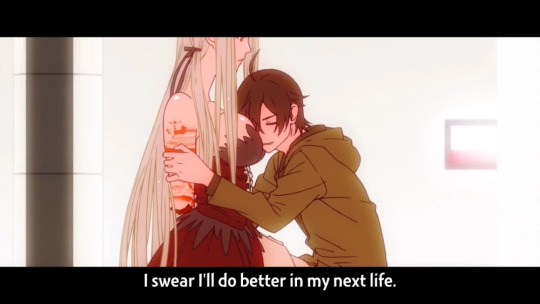
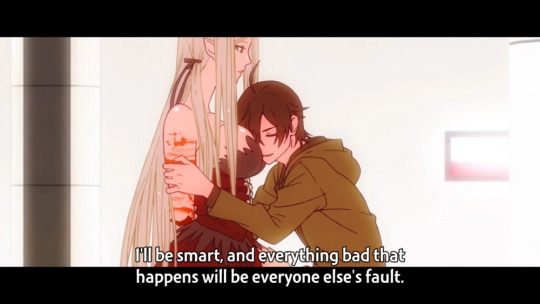
Araragi seems selfless to a fault, but he’s actually very self obsessed. While it’s true that Araragi desires to be a good person, and improve as a person, his methods for self improvement are faulty. He’s obsessed with appearances, and it’s more like he wants the appearance of a good person rather than actually having to put in the work at first. He wants to feel like he’s saved others. He wants to feel like he is someone worth something. He saves others because it increases his self worth, and also once again he gets something out of it. Araragi saving women that are weaker than him makes him feel special, like somebodyy needs him.
He wears the persona of a hero, rather than actually trying to be one. It happens again and again in the series. Despite the fact that Araragi actively does heroic things literally all the time, he also denies any role of being a hero because he does not want the responsibility of being one. Araragi wants the world to be burger king, he wants to have it his way. He wants the best of both worlds, Hannah Montana style. He wants to save girls, but he doesn’t want to be their hero and be entirely responsible for them.
“Araragi-kun, even if you can become a star, you can’t become a hero.” “I can’t become a star.” I shook my head. “I can only become a vampire.” And I even failed at that. “I see.” So you’re not going to be - my hero.
Nekomonogatari: White (Hanekawa and Araragi)
Take his actions in Nekomonogatari. Araragi claims it’s impossible to be a hero, he says that Hanekawa cannot be saved and calls for her to take personal responsibility and face everything that is wrong with her life. However, rather than trying to just support her with that difficult task Araragi immediately jumps to self harm.
It’s impossible for Araragi to become a hero, but he can swallow a katana and then trick Hanekawa into killing him because that is somehow easier than facing his feelings for Hanekawa head on. Araragi prefers bloody, painful self harm to the terrifying ordeal of being known. Araragi knows that Hanekawa is in need of help, but the fact that she is such a messy person different from the person he originally saw her as, makes him afraid of her.
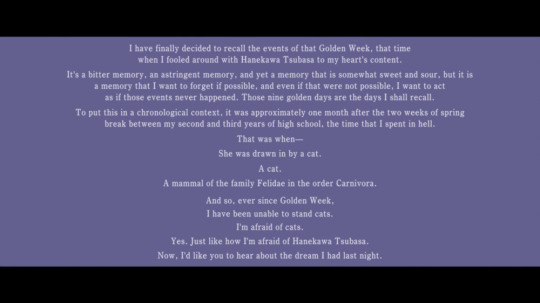
The thing is human beings are really sloppy. They are a messy gray, and Araragi wants to save them, but he really is just a kid out of his depth with a lot of things. He sees the abuse of Hanekawa’s household, and because he’s literally never even encountered an abusive life he gets so terrified that he runs away screaming. He does care about Hanekawa, but she’s far too complicated for him. He does not even want to touch that mess. It’s much easier for him to see Hanekawa as a hero, all black, or all white, then try to attempt something he does not know how to do and could screw up Hanekawa even worse.
Once again while it is not Araragi’s responsibility to fix an abused girl, and it makes sense a normal high school kid does not understand coping with abuse at all, Araragi at the same time wants to help her. Instead of just admitting that he can’t do anything for Hanekawa, he play-acts at being a hero.
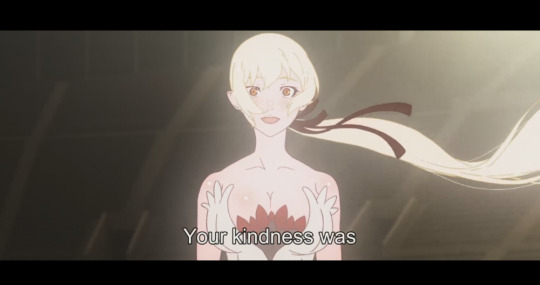
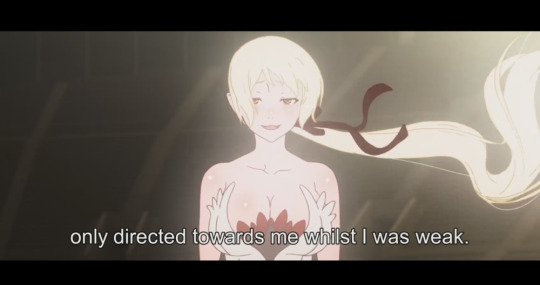
Here’s the thing about Araragi, have you ever once seen him try to save a boy? He only cares about helpless girls because those are the kind of people that heroes save. He does not care about people that are stronger than him, because then he is depending on them rather than the other way around. Araragi only interacts with about three male characters in the story significantly.
Oshino, who is an adult figure that Araragi aspires to be like, and then Kaiki and Seishirou who he both views as rivals for the two most important girls to him Senjyogahara, and Seishirou. Do you notice there is a far different tone in Araragi’s interactions with Seishirou and Kaiki? Araragi absolutely refuses to see Kaiki as anything other than a villain, and while Seishirou is clearly a victim, Araragi cares very little about actually saving him and instead prioritizes competing with him over Kiss-Shot.
Once again this is dude psychology that is present in Harem series. Did you notice if male characters do show up in harem series they are oftentimes, either comic relief, they are terrible people for the main character to look good in comparison, or they are old men mentor types. That is because any other man who would exist in a harem series is automatically competition for the girls. Araragi does not want to compete, he does not want to feel inferior to anyone else, because he always feels inferior all the time therefore he never has any male friends.
Therefore it’s hypocritical altruism, while Araragi is willing to help and that’s a good thing, he also never once helps unless there is something he gains from it. Even if it’s a chance to exercise his self loathing. Once again Araragi’s self loathing is incredibly harmful, he literally gets bones broken, limbs severed, and organs torn out almost every time he helps someone. Not only that but it’s always the first solution he jumps to. This is not the behavior of a healthy person, this is the behavior of someone attempting to punish themselves. Helping these girls by martyring himself is an act of attrition for Araragi, because he believes he deserves pain for all of his hypocrisies, but once again it’s still self obsession. Just hating yourself, just beating yourself up, is different from having to do the actual work of facing yourself and picking yourself up. Araragi will always choose dishonesty over honesty, obfuscation over seeing things clearly.
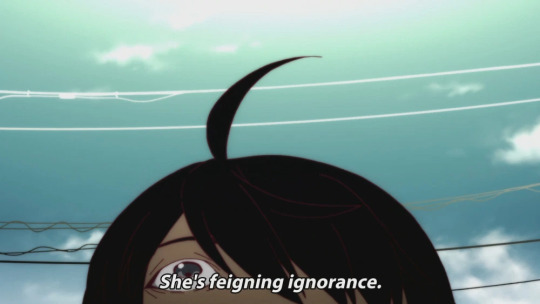
Araragi’s primary strategy of dealing with these many hypocrisies and contradictions in himself, and keeping his ‘ego’ in balance has always been obfuscation. Araragi is observant, but he presents himself as ignorant. He always goes on claiming how stupid he is, and how he’s nothing more than a worthless washout.
This is because Araragi was raised with an overpowering sense of responsibility. While his parents are not necessarily bad parents, they are police officers. He was raised made to feel responsible for things like justice, saving others, and especially made to feel responsible for his own flaws. Police officers are also symbols of justice, who as human beings often fall far short of the law and authority they are supposed to represent, because symbols are symbols and humans are humans.
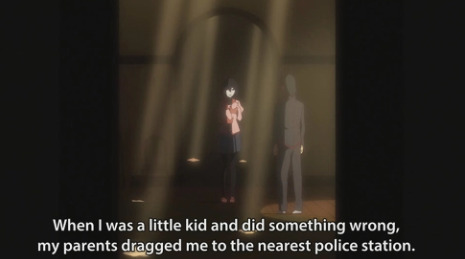
Therefore, what Araragi wants to avoid at all costs is feeling responsible. He wants to be important, but he never wants to take the responsibility of actually being important. This is his immaturity, the part of him that refuses to grow. For Araragi, if situations are too complicated for him to handle, or he fears his meddling will only make things worse and therefore he will be indicated as responsible his response is to just avoid it entirely rather than struggle or try.
This is shown in the case of Sodachi Oikura, once again someone that Araragi knew about and sympathized with but at the same time could not comprehend. Sodachi lived in horribly abusive circumstances, and both times Araragi encountered her he was a child. Araragi at the same time takes far too much responsibility, and far too little. It’s completely understandable that Araragi a middle schooler had no idea what to do to deal with what was obviously an abusive household, most adults are pretty useless when it comes to handling abused children. Yet, at the same time Araragi avoids any responsiblity whatsoever, he just forgets about Oikura claiming he has a bad memory depsite encountering her at three different significant parts of his life. Rather than struggle and fail, it’s better for Araragi to just not know anything at all therefore it can’t be his fault.
When Ougi drags Araragi through Sodachi’s case, Ougi ‘deduces’ everything, but Ougi’s catchphrase is I only know what you know. Ougi cannot have come to a conclusion that Araragi did not already know or was not capable of figuring out on his own, Araragi just did not think of those things because it was too painful to think.
This is also present in his dealing with other characters. There are several characters who have heavy romantic crushes on Araragi while Araragi is already in a relationship, Nadeko, Hanekawa, etc... Rather than ever just going through the awkward interaction of rejecting them it’s much easier to just pretend he never even notices their affections. Therefore we see him hypocritically, have a girlfriend, at yet at the same time constantly hang out with other girls who have a clear attraction to him and romantic feelings for him and never do anything about it.
Nadeko turns into a god because of obfuscation, both on Araragi’s part and on Nadeko’s. Nadeko is called out for what a hypocritical person she is never wanting to face anything directly, but that behavior is only a reflection, a foil to Araragi’s own, hence why Araragi was never able to save her.
Once again, Nadeko clearly has several problems with her personality, and she also blatantly hits on Araragi several times despite one being a middle schooler, and two Araragi having a girlfriend. Rather than just reject her outright, or acknowledge these parts of her personality, Araragi chooses to ignore everything and reduce her to being a cute girl. Nadeko puts on the act, and Araragi perceives. He then ignores all of her feelings, until they repress more and more and then bubble out into a jungian shadow expression that is Snake God Nadeko who just indulges on all of her instincts and desires and gives up conscious thought and her persona completely.
Ougi always mocks Araragi has a helpless fool, because that is what Araragi wants to be, helpless, foolish, and therefore not at fault when there are unintended consequences of his actions.
Finally, Araragi only thinks in black and white. This is also part of his obfuscation, he never wants to acknowledge how complicated people are. When he’s forced to confront the ugly side of people he almost always looks away.
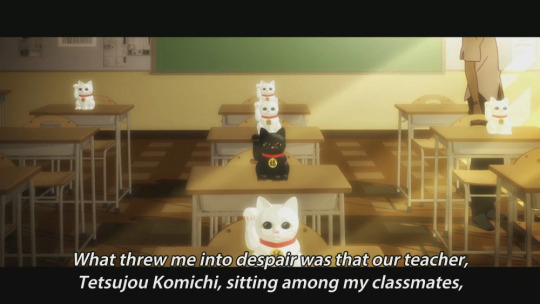
Black cats, white cats, hmmm, I wonder what that means. Araragi was only disappointed with the idea of justice, because he wanted to believe in it in the first place. He wants to believe that things like heroes can exist, and that his black and white perceptions of the wolrd are real. Araragi craves that order more than anyone else, perhaps even more than his younger sisters who just play at being heroes of justice. The reason he becomes so disillusioned is because he expects there to be an order of things, for their to be roles just like in a story, for their to be a sequence of events with meaning.
Araragi expects narrative rules to apply to real life. For life to have meaning. That is why he is a story teller. There are monsters and oddities, and humans with a clear line between them, despite the fact that Araragi himself is someone who blurs these lines by existing as a quasi vampire. Araragi’s life is a story that he tells himself, and that’s why it’s so important that his perceptions are so off. In Tsuki he even gets called on this twice, he calls his increasing vampirism punishment instead of just consequences for his actions and he’s told not to think he’s so special that god would go out of his way to punish him. Tadatsuru asks why they are facing off like this, why Araragi is protagonist and he is antagonist.
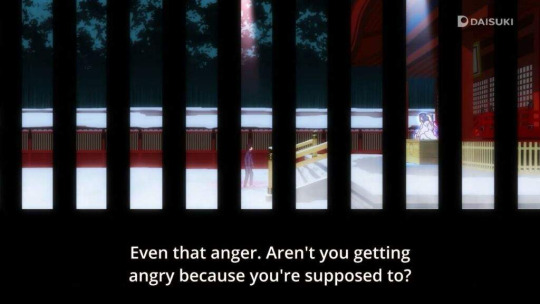
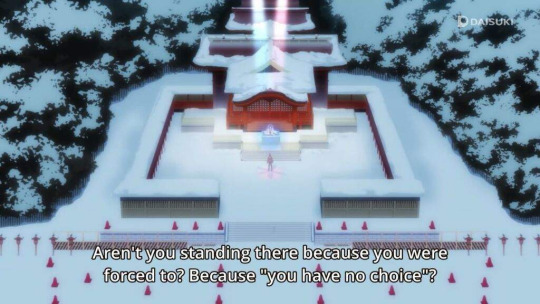
Araragi does not like acknowledging how sloppy the world is, because that makes him feel insignificant and weak. It would make anybody feel that way, because it means acknowledging that we are not as in control of things as we would like to be.
3. Oshino Ougi - They Reveal
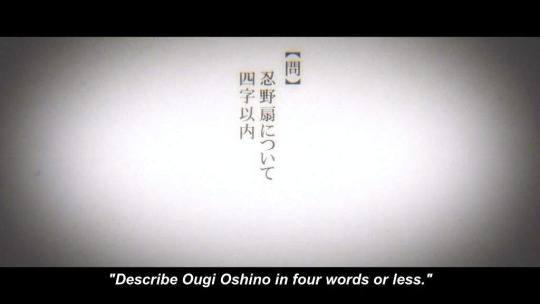
Ougi Oshino is Ougo Oshino.
They are a vague existence, Araragi refuses to define them because defining Ougi means defining themselves and that kind of confrontation is the last thing Araragi wants.
Ougi Oshino is born out of a desire for Araragi to punish himself, the same way he always seeks external punishment by allowing people to beat him up and rip out his intenstines. Rather than confront what is inside of him, Araragi externalizes it and confronts it as an external force which he projects upon.
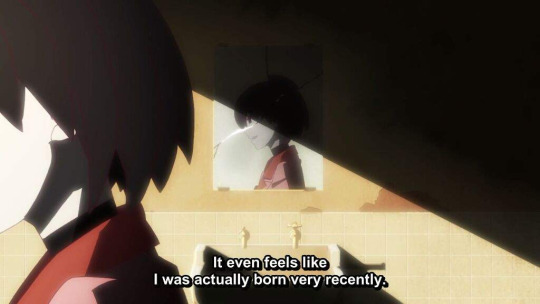
Ougi is a shadow born from the light of Araragi’s ego. It was not the darkness that created them, but rather Araragi himself and the shadow he cast. Therefore while Ougi can be seen as a corrective force, they actually embody all of those flaws that Araragi has, and their own character traits are always in response to those flaws.
Wheraes Araragi is a hypocritical altruist, Ougi is someone who exists to fix people’s mistakes, or punish them for their mistakes rather. Despite manipulating them, Ougi also ultimately leaves them up to their own fate. He leads them up to the cliff but does not push.
Ougi is a hypocritical fixer, because while he seems to be punishing others for their mistakes he really only exists to punish himself in the form of Araragi. All of the ‘mistakes’ he corrects are just Araragi’s own mistakes foiled in other people.
Nadeko is a foil to Araragi, she represents his own feigning of innocent and being unknowing. Kaiki is a foil to Araragi, he represents how much of a fake Araragi is by pretending to cling to ideals of justice and saving others but also denying them as well. Sodachi is also like Araragi, they both prefer to wallow in misery than try to work towards their own happiness. Araragi even says his famous line with his relationship with Shinobu, an ending where everyone is miserable, where nobody gets what they want. There are serious problems with his current relationship with Shinobu, a power imbalance, and both know they cannot last this way forever but rather than attempting to fix their relationship they both cling to the way thing’s are.
Repression and obfuscation is always favored over directly addressing the issues, especially the things which Araragi probably cannot control, or fix, like the complicated nature of abuse. Ougi claims they operate out of some imaginary set of rules that totally exist, but once again Ougi is the hypocrisies of Araragi laid bare. They are every bit the hypocrite that Araragi is.
They are just punishing other people who reflect Araragi’s negative traits. Those who do not acknowledge their shadow, will project their flaws onto other people and see themselves in other people in order to cope.
Ougi is made up of Araragi’s repressed desires. They are a girl he wants to save, which is the only type of person Araragi interacts with. At the same time, they are also connected to Oshino, who is Araragi’s model in the series for adulthood and maturity. Oshino who is always able to figure things out, and very self-collected often making fun of Araragi for his youthful excitement and his naivete for not knowing much about the world.
While Araragi presents himself as an idiot, Ougi is intelligent an capable of figuring things out from scraps of information. Araragi jumps to conclusions, Ougi is deductive and a good thinker. Ougi Oshino already knows Araragi better than himself, therefore Araragi does not have to carry any of the burden of self reflecting, or making himself known to other people around him.
During Ougi and Arraagi’s first meeting in the anime, he hallucinates that the classroom that he is locked inside of floods with water. The depths of the water, the shadow, dreams, these are all the realm of Jung. If the conscious mind is the water’s surface, then the subconscious is its depths.
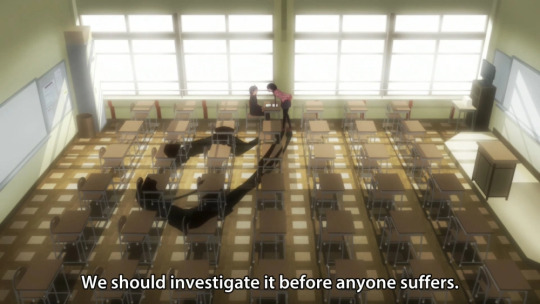
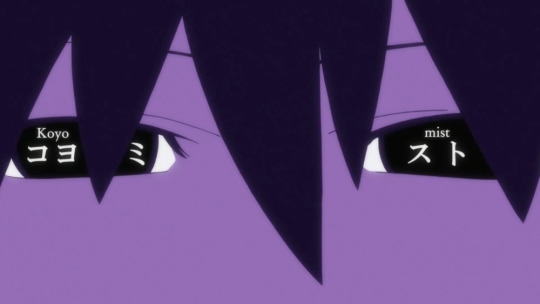
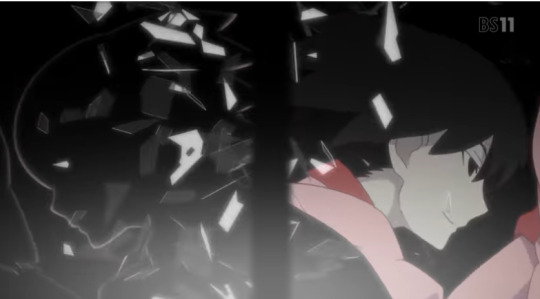
Araragi obfuscates, whereas Ougi reveals the uncomfortable truth. Ougi always positions themselves as a detective. In the realm of stories, it is the detective who makes the big reveal at the end. After all Ougi even says when they are locked in the room together, because there is no famous detective that Ougi themselves will play the role and announce the culprit.
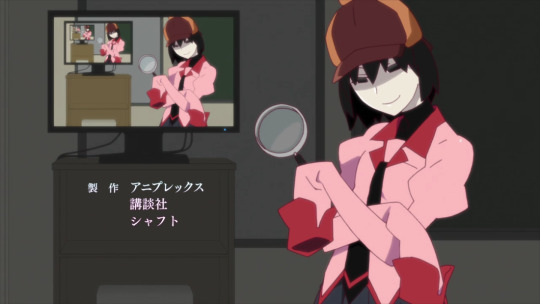
However, Ougi’s reveals are just as hypocritical as Araragi’s obfuscations. Ougi takes the shadow to be representative of the whole self, because they themselves are a living breathing Jungian shadow, but just like Jekyll and Hyde man is both. He is not one or the other, he is both at the same time. Ougi always act with the assumption that there is some kind of truth to be revealed, that this is just like a detective novel where there is a reveal waiting at the end.
Ougi takes the repressed desires to count as the “truth” of the whole mind, and ignores the conscious mind entirely. Therefore, in their view Nadeko is only capable of being a selfish cute girl who sees herself as a victim, Hanekawa is only something scary which Araragi must avoid. They at the same time as Araragi both read the same black and white narrative of the world. They do not care at all for the persona, or how people choose to present themselves. Desipte what Kaiki said to Nadeko that people can choose to be whoever they want to be, and they can try as many times as they like.
Ougi also views themselves as inhuman, and therefore incapable of doing anything, or defining themselves as anything outside of their role. Ougi is in a way, just as repressing of themself as Araragi is. They even lament this in front of Tsukihi, that once the detective reveals the mystery the novel is over. That if anybody would know the truth of them, they would come to hate them because they are abhorrent.
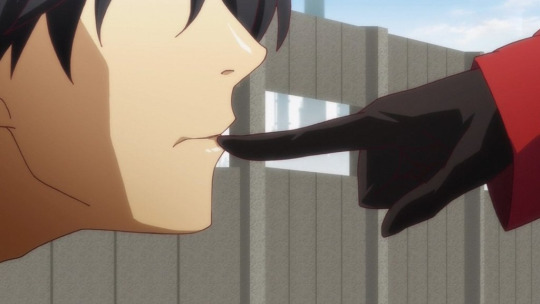
Ougi by repressing concious thought, silences other people and what they have to say about themselves. The only thing that matters is the repressed, what Ougi dictates as the truth must then become the truth. It’s just as much a limited way of saying the world as Araragi’s is. Hence Ougi’s famous catchphrase, I don’t know anything, you’re the one who knows. Ougi sees themselves as a person fundamentally incapable of knowing anything other than outside the bounds of what Araragi already knows.
Which is finally where the black and white thinking comes in. While the two of them seem like polar opposites, their views of the world are actually the same. Ougi wants what Araragi wants, for the world to exist like this is a story. For there to be roles, and order and most importantly meaning. The same way that Araragi just ignores things that fall out of step with their roles, when people contradict the way Araragi sees them he just pretends to be oblivious rather than see them as complex human beings. Ougi actively goes out of their way to punish people, for not playing the role in the story they were supposed to play. He acts like a corrective force, pushing people back into their roles. His wrongful assumption is not that people improve by “correcting mistakes” but rather there was a proper path in the first place. That there was a hero’s journey they were supposed to be going on. There is no path, there is no meaning, it’s all senseless but Ougi exists out of a desire for things to be sensible.
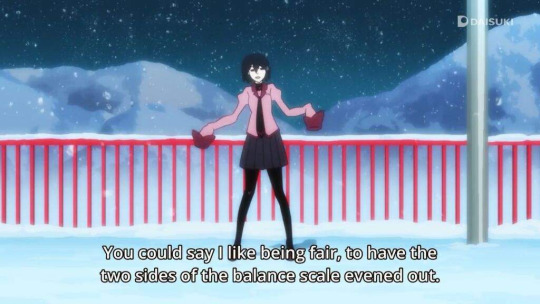

Ougi exists as Araragi’s opposite, because Araragi assumes that things like binary opposites exist in the first place. Heroes and villains, crime and punishment. They both believes these things exist in a fundamental order in the world, and they are not just made up values that humans invented and give meaning to.
“Let’s not joke. Virtue is the antonym of vice, not of crime.” “Are vice and crime different?” “They are, I think. Virtue and vice are concepts invented by human beings, words for a morality which human beings arbitrarily devised.” (No Longer Human, Osamu Dazai)
For both of them clinging to these hypocritical beliefs are better than the alternative, admitting to their own helplessness in the face of a world that is mostly indifferent to them.
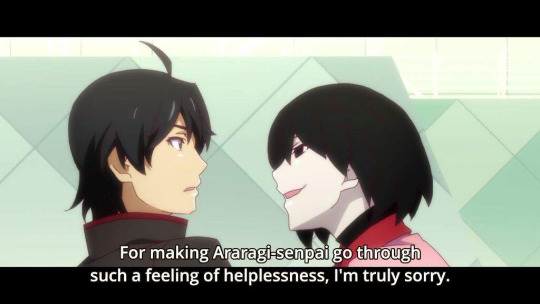
That’s why, when they are separate both of them choose to stick to their ultimately restricting and punishing roles, as protagonist and atagonist, persona and shadow, hero and villain, rather than just trying to acknowledge themselves and live as people.
Both is one, and one is both. Araragi Koyomi and Oshino Ougi have a relationship that ultimately results in not antagonism, but rather union and acceptance. Just like the King of Distortion is not an enemy of mankind in the enemy, Ougi was never an enemy to Araragi in the first place. Araragi never needed to hate himself or punish himself. The true path forward lies in union and acceptance.
You can never be anything more than yourself, nothing more and nothing left.
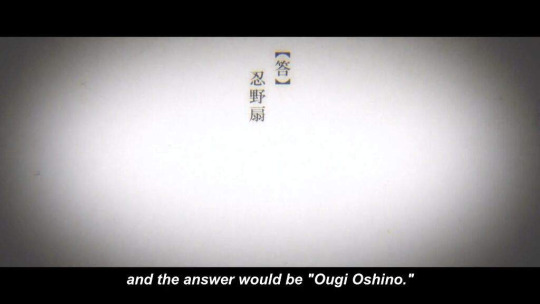
72 notes
·
View notes
Text
I don’t care about notes anymore. I’m going to write long winded meta for all ten Zaregoto fans and all seven Medaka Box fans out there.
#spooky speaks#Your daily reminder to read medaka box and zaregoto#you could be the eleventh and eighth fan respectively#and you'll know what i'm talking about
8 notes
·
View notes
Note
i like this take on Umineko (contrasted against Zaregoto, a series i much prefer)



in particular, the point about how Umineko textually references the golden age of references like with knox's rules, but doesn't use those mysteries to inspire its own story. Ryukishi feels inexperienced with mysteries which is a bad thing when the story is vocally Trying To Talk About Mysteries. simply put, he comes across as trying to seem smarter than he really is. there's a lot else i take issue with, even in Umineko's meta elements, but this really cuts at the heart of why Umineko sucks as an actual mystery
what stories do you find more simple than the fandom claims?
umineko
63 notes
·
View notes
Note
How would you characterize Ii-chan's relationship with Kunagisa?
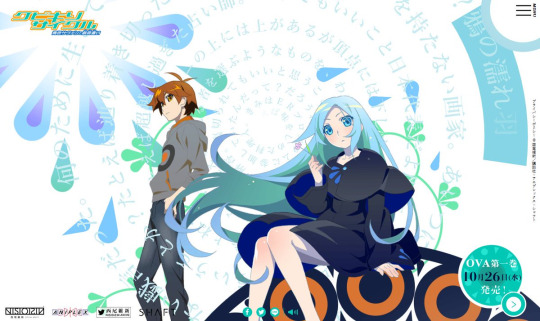
Ii-chan and Kunagisa in the first novel alone already begin on pretty shky grounds with their relationship. However, the first novel does have a decidedly romantic climax where Kunagisa proves her affection for Ii-chan, and Ii-chan is able to admit his feelings for her are those of love. After that point their relationship gets progressively darker through each succeeding novel. So, to talk about their relationship you kind of have to go novel by novel.
To start with though, the entire basis of their relationship is an analysis on a codependent relationship.
Codependency is a concept for a dysfunctional relationship where one person enables, another person’s addiction, poor mental health, immaturity, irresponsibility, or under-achievement, among the characteristics is an excessive reliance on other people for a sense of identity. It’s not really a psychological disorder but rather a description of a type of relationship dynamic.
In the first novel we are introduced to their relationship. Ii-chan is a dropout of the once prodigious ER3 program which was meant to raise geniuses of research. Iichan defines himself as a normal person who tried and failed at being a genius more or less, a teenage burnout who is now coasting through college. Of course Ii-chan’s descriptions of himself, and assessments of his own abilities and intelligence are never accurate but we’re only going novel by novel so let’s take him at his word for now. Basically, the Ii-chan we’re presented in novel one is a burnout, somebody who actually tried hard studied abroad in an exclusive program, dedicated a significant portion of his life to it, and tried to become one of those special persons known as a genius and then gave up and went home for undisclosed reason. He’s someone who fought hard against his own normality and tried to improve himself, and then gave up on that too. Now, Ii-chan barely remembers his past and claims to have forgotten everything he learned in the ER3 and possesses a faulty memory that makes it seem like all of those years of hard work amounted to nothing, and tries his very best to not stand out and pass as an ordinary person in every situation.
Then in comparison you have Kunagisa. It’s casually mentioned that she led a group of hackers that reformed the world in the first novel as a side detail. Despite being an international terrorist she has a happy go lucky personality. She’s smarter than Ii-chan by leaps and bounds and also she was born that way. It’s remarked many times that she’s a savant and is able to reach heights that even hard workers like Ii-chan must have strived to naturally. However, unlike Ii-chan she cannot do several things a normal person might do. She’ll go long periods without bathing, she has several tics like how she cannot climb stairs alone. She also in general doesn’t seem to read or be affected by mood at all. She’s off in her own little world unaffected by the rest of the world. It’s no coincidence that Ii-chan is the characters whose always walking around struggling with human interaction and most of the time Kunagisa is off to the side for the majority of the novel.
So the two of them are contrasts to one another, Ii-chan is the struggling normal person who can do normal person things for her and often goes out of his way to take care of her and protect her. Kunagisa is the abnormal one who seems to exist purely, without any kind of struggle affecting her, and can usually achieve exactly what she wants to achieve without effort while Ii-chan will struggle the whole novel and his actions will be ultimately meaningless. However, Kunagisa cannot do several things for herself and cannot engage with others like a normal person and relies on Ii-chan entirely for that human connection in her place. They have complementary personalities, so from the first novel it can easily be seen why they are attracted to each other. However, as the novels progress it becomes clearer and clearer that rather than being in a mutual relationship of support it’s more that they are clinging to the ideas of one another.
So, starting from the first book after being introduced to these characters there’s several hints of the darker shades of their relationship. The first thing he says about their relationship is that Kunagisa needs him, but also that it doesn’t really need to be him. He views himself as replacable to her, because she’s a one of a kind genius and he’s just a normal guy and therefore she just needs someone to take care of her and do normal things for her and Ii-chan believes it could be anyone who plays that role.
“I met her before I was in the program. So there’s a blank of five years.”
“Mmm, and when you got back she turned out to be a cyberterrorist, huh? That’s a sordid little tale.”
Indeed.
I saw it coming even when we were thirteen years old. Nevertheless, reuniting with her after my five years of study abroad, I was honestly surprised at how little had changed from the old days. Anyone would be surprised to suddenly return to their early teens. Of course, that was just how things seemed. In reality, she had become much more human in terms of personality.
Our relationship.
Asked flat out, it was a tough question to answer.
Kunagisa needed me—that much I knew. However, it didn’t really have to be me. It would be extremely difficult to explain the circumstances that surrounded us. To do so, I’d have to explain a lot about Kunagisa herself, and I didn’t especially want to do that.
There’s also Ii-chan’s trademark complete unwillingness to confront or explain anything. As you’ll see avoidance is the word of the day when it comes to hm. It’s in this talk that codependence is first brought up in regards to them.
I haven’t talked with Kunagisa-chan all that much, but it seems to me she has too many shortcomings to go through everyday life… Hmm, I guess I shouldn’t say shortcomings. It’s not like she’s defective. But her focus is just so skewed. It reminds me of my friend whose kid is a savant.”
Savant—in French, it means a person with wisdom. I was aware that Kunagisa, too, used to be called a savant. I probably knew too much about her.
“So she probably really does need someone like you looking after her. There’s no doubt about that. But I mean, how does that make you feel?”
I didn’t have an answer.
“It seems like you two have something of a codependent existence,” Akane-san continued.
“Codependent existence?”
She tilted her head as if to say, “Haven’t you heard the word?”
“It’s a symptom of addiction that affects human relationships. Like, for example, let’s say there’s a recovering alcoholic who has a caretaker by his side. He needs that caretaker, and the caretaker devotedly looks after him. But when that devotion goes to extremes, it’s a sign of codependency. They get drunk on serving. You even see mild cases of it in romantic couples. Needless to say, it’s not a good thing. You end up putting each other to waste. I’m not going to say you two are like that, but you might want to take care.”
In general, Ii-chan suppresses his existence to try to live as conflict free as possible. He’s avoidant to extreme and tries to avoid any kind of close relationships, having to have others have feelings for him and at the same time not wanting to have feelings for any others. He doesn’t like conflict and finds any kind of it exhausting to continue to deal with.
You won’t argue but you won’t agree. You accepted my shogi challenge because you knew you would definitely lose, isn’t that right? You wouldn’t accept a challenge or compete otherwise.”
I didn’t hate losing, I hated competition. I was thoroughly put off by the idea of vying with others over something. I hated fighting as well and thus never made friends.
Anxious and avoidant are the words of the day when dealing with him. He avoids everyone because of this, and talks about how it’s actually much easier to live unattached but at the same time he also admires the genius part of Kunagisa. He wants to be special, to be unique like a genius is, and he also wants to be special particularly to her.
“So that’s it,” Akane-san said. “You don’t want to be loved by her. You want to be chosen by her. As her one and only.”
I…
Couldn’t argue with that.
“Hmm, but why her? That’s what I can’t figure out. It seems like there must be some obvious reason, but I don’t get it. If you two were a couple, there would certainly be some clashing factors, right? In fact, one would think you would be unattracted to someone so easy.”
Easy?
Who?
“You mean easygoing?” I said.
“Right. Anyway, theoretically someone with a personality like yours wouldn’t be able to endure a relationship with a girl like that, emotionally immature despite being in a superior position. Plus, you’re a man.”
“It’s fun being with her. Or well…” I chose my words carefully. “Rather, it’s fun being by her side.”
My favorite place in the world was by her side. I had returned to Japan for that very reason.
So basically, from the start Ii-chan’s desire towards Kunagisa are a paradox. He’s given up on trying to be a genius himself and seems to resent geniuses, but part of the reason he loves Kunagisa is her genius. He wants to be a special person to Kunagisa, but that also comes from a desire to have himself feel special, irreplaceable, a person who stands out in the crowd in some way and it also comes from the fact that no matter how extraordinary Kunagisa is there’s a certain part of her that’s dependent on him which gives him power in the relationship.
In the first novel alone Kunagisa and Ii-chna’s relationship gets compared to Akane and her accomplice in the murder. A pair of people, one of them an unbelievable genius, and Shinya her helper who serves her that kill people and take over their identities. Ii-chan compares himself to Shinya over and over again and realizes Shinya is the dark side of him, somebody who enables a murderer just so they can continue to stay by their side.
And then.
And then, take Kunagisa.
Nothing really matters to me.
The world just does what it wants, and even if it didn’t, that would have nothing to do with me, and even if it did have something to do with me, I wouldn’t be interested. I’ve never wanted to become someone, and I’ve never felt like there was something I had to do. Sometimes I wonder if that’s okay, but in the end, that doesn’t really matter to me, either.
Somewhere along the way I just cooled off. No, that’s not right. Probably, I dried out. Apathetic and indifferent. And that’s why Kunagisa was moisture to me.
Then take passages like this and it quickly becomes clear, Kunagisa is a substitute for Ii-chan, because he refuses to try to engage with the world at all at this point. He wants it all to pass him by. He wants to simply be a nobody, but he also can’t deny the part of himself that needs human connection and to be seen as a human. So he invests absolutely all of it in Kunagisa, and uses her as his substitute for the whole world.
So he’s closer to her than anybody else, but he’s also farther than her from everybody else. As what he’s seeing is not Kunagisa, but rather the image of her that he clings to. Her purity is remarked upon agian and again.In volume 2, it’s basically elaborated on all the darker parts of Ii-chan’s character that were concealed in volume one. Summarized very succinctly, Ii-chan basically doesn’t give a shit about anything or anyone. To get into it deeper, it’s basically impossible for Ii-chan to return, respond to, or even react to other people’s feelings unless it has something to do with himself, or Kunagisa.Hence why the only person he really gets along with in the book is his dark reflection HItoshiki Zerozaki. He forgives and lets go a mass murderer and makes no attempt to stop them because they have something in common with him, but goes out of his way to antagonize somebody who killed one person because that girl was not like him in any way. Ii-chan is basically self absorbed. I’m going to point out some genius symbolism here. The only name we know him by is “I”, he really only cares about himself and his own ego. However, it’s trauma that’s rendered him that way. “Something” happened it’s never really clear what, and Ii-chan retreated completely into himself and got stuck in his own head and doesn’t want to engage in the world at all as a complex way of dealing with the trauma he’s saddled with on a daily basis. So, Volume 2 is basically about how Ii-chan can’t engage with the world at all, he gets involved in a normal friend group and basically forgets about all of them by the end of the group, and doesn’t really care about their emotional struggles even when he was at the center of them. He even antagonizes two girls into suicide, even though he considers murder to be an absolute evil and a line he’s terrified of crossing for himself.
However, Kunagisa is barely in this book and only shows up at the end. Which is the point, hmmm I wonder why Ii-chan barely cared about the events of this book. It’s because they barely involved Kunagisa at all. What Ii-chan considers his “Humanity” and his “Human Emotions” and his “reasons to keep livnig’ or whatever you want to call it are entirely invested in Kunagisa. She’s something he considers entirely detached from the world. Twice within one chapter he remarks on her purity.
She was pure innocence .She had heard everything I had just discussed with Aikawa-san, and still she hugged me like this.I had cruelly antagonized two people, and yet completely overlooked a mass murderer.
And Kunagisa didn’t harbor a single negative sentiment toward me for it.… .
Aikawa-san had been wrong about just one thing.
But it wasn’t her fault. She probably just didn’t have me fully figured out yet. By no means do I consider myself a deep person, but I do recognize that my sins run so deep there’s no way to see all the way to the bottom. The depths of me were invisible, no matter what kind of contract work you did.
The reason I didn’t want to have that discussion in front of Kunagisa wasn’t because I was afraid of her judging me. It was because I knew she would neverjudge me that I never wanted to expose my ugliness or my ego to her.Hers was an all-embracing love. Unwavering, undiluted affection.If I killed a person directly, she would probably forgive me even then. She would love me all the same.
To me, that love was just a little too heavy. I could feel it crushing me.That wide-open devotion.It wasn’t that I couldn’t feel affection toward others. It was that I couldn’t receive affection from others. No matter how much adoration Mikoko-chan showed me, all I could respond with was disdain for a murderer. No matter how much her feelings for me had inspired her actions, all I could see was another homicide.
“Uni? What’s wrong, Ii-chan?”
She blinked at me with those big, pure pupils.
That azure hair.
Exactly the same as five years ago.
And now it was five years later.
Sooner or later, the time would come.
When I’d buckle under the weight.
And the urge to destroy her would arise.
Even then, she was sure to forgive me.
Even if she was murdered or destroyed, she would forgive me.
Just as she had done five years ago, with that innocent, beaming smile, as if nothing had even happened.
Once again Ii-chan’s paradoxical feelings manifest themselves. What he loves about Kunagisa is her purity, because she’s a person who kind of just accepts him and needs him without condition and he can’t stand the conflicts or emotions of other people. At the same time, he can’t stand her purity either because that too is still too much affection for him.
In a way, Ii-chan fetishizes her purity like a lot of other people do around her. He invests his humanity in Kunagisa, but at the same time he refuses to see her own humanity. As if she was a human she could stop performing the role that he’s assigned to her, she could stop being dependent on him, and he might lose the person he’s dependent on. Humans have legs that can get up and walk away, objects generally don’t. What he feitshizes about her is her own innocence, her purity, he infantalizesher and treats her like a child rather than someone his own age. He remarks several times how she’s exactly the same as five years ago, and treats her like a child who does not have thoughts, feelings, or emotions or reactions to the outside world. That Kunagisa simply exists int a little Kunagisa world of her own and Ii-chan is a special privileged visitor of her.
Not only that but if you’ll notice the way Kunagisa lives is the way Ii-chan wants to live. He wants to be pure, he wants to be untroubled by anything, he wants to be able to completely shut out everybody else’s feelings and perspectives. Ii-chan strives to be pure by rejecting everything, whereas Kunagisa already exists in that pure state and Ii-chan is her connection to the normal world. She lives unattached which is how Ii-chan desperately wants to live.
As a quick aside this is also like, a common way people on the autism spectrum are treated. Infantalization is a way of denying them any agency or autonomy. Then volume four hits and the entire start is a deconstruction of their relationship. Not only Ii-chan but basically anybody that Kunagisa comes into contact with seems to idealize her, to objectify her. Green green green rants on and on about how she’s somehow the perfect being, how they all want to exist to just be her toys and are honored by it, and then he elaborates the nature of Kunagisa and Ii-chan’s relationship. That not only is Ii-chan stopped five years ago since meeting her and refusing to grow, but the same happened for Kunagisa Tomo. Their mutual love is a fixation on one another.
That’s what’s called mutual feelings, mutual love – but, in that case we can think this way, too. What if you and Dead Blue are similar and share a similar relationship, then just as your time has ceased by being with Kunagisa Tomo, then what if, just the same, because of you, Kunagisa Tomo’s time has also ceased–”
This is the novel where we start getting hints to that the dark side of the relationship is not only Ii-chan’s fault, not only his fixations, but Kunagisa is partially at fault as well. That Kunagisa shows possessiveness over people like toys exactly as Green Green Green Green Green describes her.
Kunagisa Tomo spoke.
“Give Sacchan back.”
”……….”
“That belongs to me.”
”……….”
“I place what belongs to me by my side. At the very least, it’s unpleasant to have him owned by the likes of you.”
”….. That’s your own opinion,” the Professor barely managed to retort. He retorted to Dead Blue. “You threw that away. What’s wrong with picking up what’s on the ground?”
“Even things I’ve thrown away. Even things I’ve thrown away are still without a doubt mine. It’s unpleasant to have something you’ve thrown away picked up. … you know, Professor. Dead Blue is extremely greedy. Do you not even realize that much…?”
Not only that, but there was something Ii-chan did six years ago, that Kunagisa is unable to forget and also.
She did not forget. She cannot forget.
That was why Kunagisa Tomo would never forget.
How she was duped by me six years ago, how she was treated by me six years ago, how she ended up because of me six years ago – she cannot forget. Even if Kunagisa herself wants to forget, she cannot forget.
How sinful, how encompassed in penalties a human I am.
Will not forget.
Remembers.And yet, she embraces me like this.She forgives everything.Like a mother toward an infant child. Like an owner bitten by their dog. Like a tolerant goddess.She forgives everything
In the end, I am just like Green Green Green, just like Cheetah, just like Double Flip, just like the rest of Team – simply owned by Kunagisa Tomo.I am the one being owned.The way I was being owned was just different from Utsurigi and others. And the way I am owned is just more vicious than Utsurigi and others, that was all.
That her purity is the exact reason that he did this terrible thing that is never elaborated on. Now, as Ii-chan is unreliable what exactly he did to her is kept vague however the result is their current relationship five years later. Kunagisa is unable to move on, Ii-chan feels like he wasted five years in the ER3 and didn’t change at all, their relationship remains exactly the same as five years ago.
Over and over again, the words “Using each other”, “Ownership”, “Pure”, comes up and by the end of volume five we see the dark side of Kunagisa’s purity.
Kunagisa – probably knew everything from the start.
That Ishimaru Kouta was Aikawa Jun.
The truth, the reality behind the scenes.
And this conclusion.
And yet she remained silent.
She remained silent, and watched.
Alright, that is not bad at all.
That is not betrayal.
There is no betrayal where there is no conviction.
There is no betrayal where there is trust.
Even I–
Kunagisa plans a murdere and Ii-chan helps her get away with it. Even if Kunagisa didn’t kill that person with her own hands, she still enabled somebody else to commit the murder so she could get one of her possessions back. Not only that, she also knew the whole time and pretended to be innocent even when she was accused of the murder.
Now, Kunagisa has become what Ii-chan was afraid of her and him becoming in the first book. Ii-chan is akane, killing someone and replacing them, and Ii-chan is Shinya, covering it up for her and allowing him to get away with it. The darker side fo Kunagisa is made manifest, these people are possessions to her and those that take away her possessions she’s willing to even plan a murder to get them back.
Then volume six happens and we finally get Kunagisa’s own perspective of their relationship. Translation by @darkcherrymystery
In Hitokui, about halfway through I think, iichan wakes up in the house he and a bunch of others were staying in and finds everyone dead
He has an elaborate mental breakdown and runs back to Tomo. Whereupon she tells him
“So I don’t really mind. Whoever you like, whoever you love, whoever attracts you, whoever you embrace, whoever you kiss, whoever you have sex with. None of that matters; actually, I’d support you. If you’re having fun, it’s all fine, Ii-chan. There’s no need for distortion; you can be yourself. If you become an honest person, I’d be super happy for you. After all, I’m interested in how you’ll turn out, Ii-chan. Ii-chan’s happiness is my happiness. So you’re free to do and think whatever you want. –But, just one thing.”
Kunagisa’s pupils–
Changed from blue, to blue.Clearer.Purer.
“If you stop being mine, Ii-chan, I will destroy this planet. You mustn’t ever leave me like you did back then. If I don’t have you, I won’t want anyone else. I will destroy everything without a trace. I will kill everything and not even cinders remain.
It’s implied that the terrible horrible thing that Ii-chan did to Kunagisa five years ago, might have just been moving away to the ER3 and trying to be his own person separate of her. It still could be something else that Ii-chan never tells us what it is, but my reading of the implication that destroying Kunagisa was just leaving her.
As the two of them are so close to each other they’re almost overlapped. Part of Kunagisa is in Ii-chan and part of Ii-chna is in Kunagisa, because they’ve divested the entirety of their humanity in their connection to one another. Him leaving would destroy a part of her, she’s absolutely terrified of it.
So, this is the result. Not only is Kunagisa not allowed to change or become any less innocent, but Ii-chan is not allowed to leave her in any significant permanent way. As a result of dehumanization by everybody around her, Kunagisa’s purity becomes a sign of her inhumanity.
Like, Kunagisa is in fact a person.These are people in the end, despite the dramatics that others make them out to be. Ii-chan when Jun thinks that if he put his mind to it could destroy the world with his nonsense tells her to calm down that he’s a normal angsty emo kid. Kunagisa is too, a person. She’s a person no matter how much talent she has. She’s a person no matter how much her neuro-atypical personality makes her act childish or prevents her from grasping the normal world. So, Ii-chan’s precious “purity” is dehumanizing, it’s terrifying. It’s abnormal and indecent, she treats people like toys, she treats Ii-chan like an object.
But it’s also a pretty logical result of everybody around her treating her like she’s either a baby, or the most talented, most special, most amazing thing in the universe just because she happens to be smarter than most people.
Not only does Ii-chan have no human connections, but Kunagisa has almost nothing to ground her. Her hacker friends just consider themselves her toys and would commit murder for her with no resistance. She’s cut off from her family and apparently her brother has a serious complex about her and doesn’t treat her like a normal brother would. Everybody around her is either utterly, utterly in love with her or loathes her very existence for being a genius but everybody only sees the genius, not the person.
Therefore, why Ii-chan is so special, he’s the closest thing to a normal relatinoship that she has as well.
So this is the result for both of them. Both of them don’t want normal relationships, they’re terrified of it, but also both of them can’t stand to be alone. Losing Ii-chan would mean being alone for Kunagisa. So, they’re both closer than anybody else, but farther apart from anybody else.
Kunagisa tells Ii-chan straight up that she’s not going to make demands of him of a normal lover in a normal relationship, because any of that might drive him away. She’s afraid to be attached to him, so she makes no demands except that he’s never allowed to leave her for good. Ultiamtely he always has to return to her.
So, she makes no demands, but she restricts his freedom. Because ultimately what matters is not Ii-chan, not what Ii-chan is giving her, but rather the idea of Ii-chan, once again she wants to make it so Ii-chan will never leave. So she makes no deamnds of him but demands everything from him at the same tie. She tries to avoid doing anything that will scare him away but also uses intimidation and threats to rob him of his own autonomy.
Once again, it’s a paradox. That’s what you have with a mutual codependency. Both Ii-chan and Kunagisa are each other’s normal human connection, but both of them are also terrified of having to do things normal people do like engage with the world, have conflicts, and struggle, so both of them are instead fixated on the images of each other they have. They use each other as a subitstute for all of their other relationships.
Yet at the same time that also prevents them actually being able to advance their relationship in any significant way. As both of them are too busy running circles trying to maintain the paradox of their relatioship, and keep their relationship exactly as it is for fear of losing it, for fear of losing their one human contact, their one refuge of the world, their one thing, that they never ever try to change or develop their relationship.I cannot live with you, or without you.A mutual codependency.In other words a paradox. In other words it’s nonsense.
#zaregoto meta#metasks#hello only piece of zaregoto meta on the internet#Anonymous#iichan#zaregoto#kunagisa tomo
60 notes
·
View notes